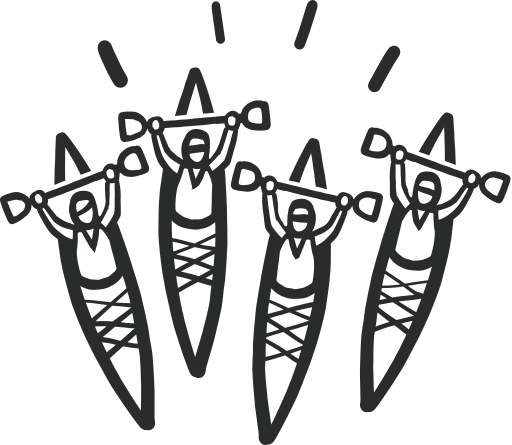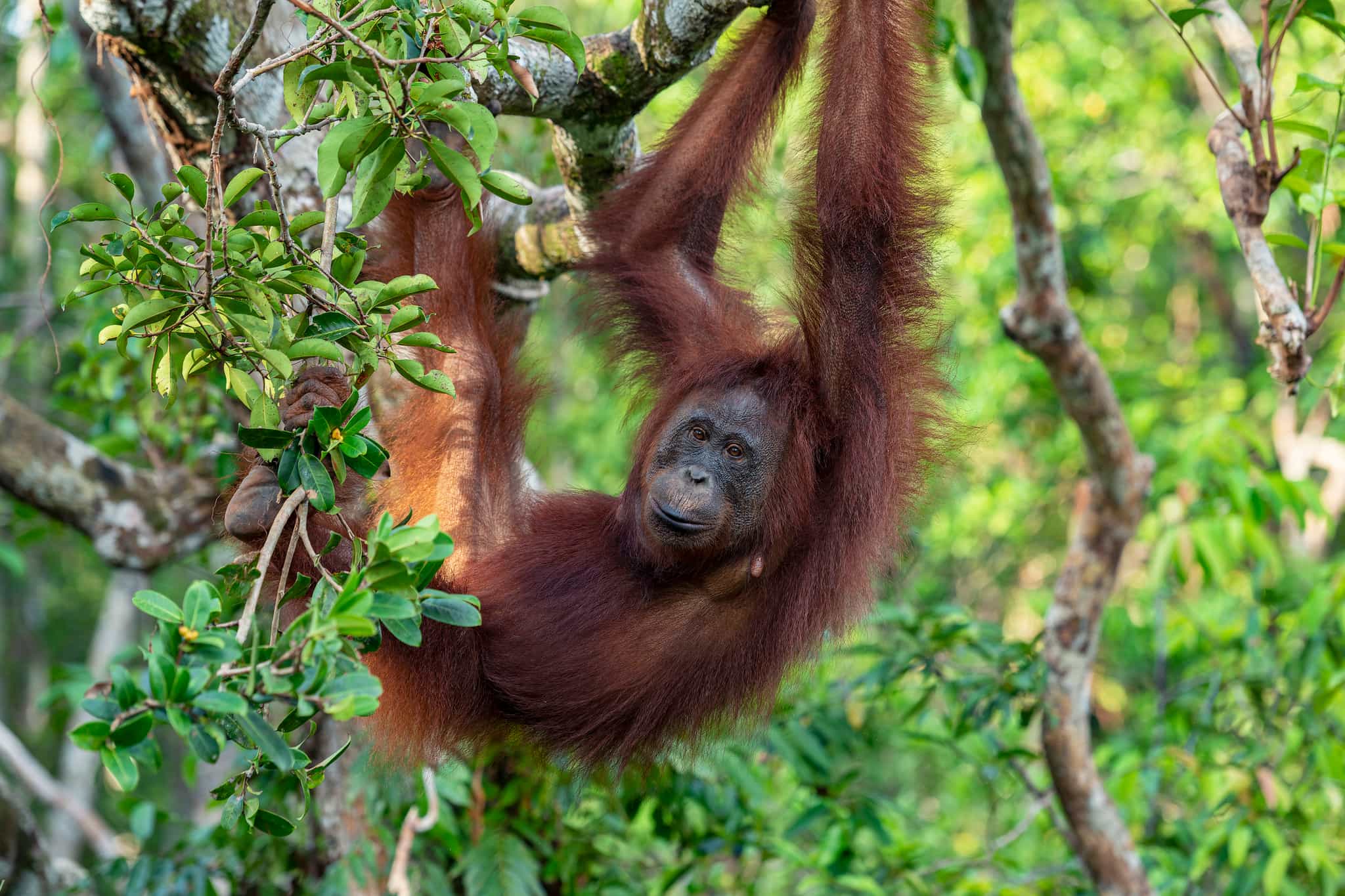
The Ultimate Adventure Through Wild Borneo
Hang out with orangutans, stomp steamy rainforests and kick back on remote tropical beaches in the wilds of Sarawak
What's Included?
Activities & Certified Guides
All itinerary activities with expert, local, English-speaking guidesAll accommodation
2 night in hotels, 2 nights in a homestay, 3 nights in forest huts and 2 nights in an eco-lodgeMeals
All breakfasts, 7 lunches and 8 dinnersTransfers & Permits
All airport transfers, local transfers and National Park permit feesEquipment
All your cycling and kayaking gearSmall Like-minded Groups
Solo-friendly by design, join our small n’ sociable groups of up to 12 like-minded, active and outdoorsy people…
What's it like?










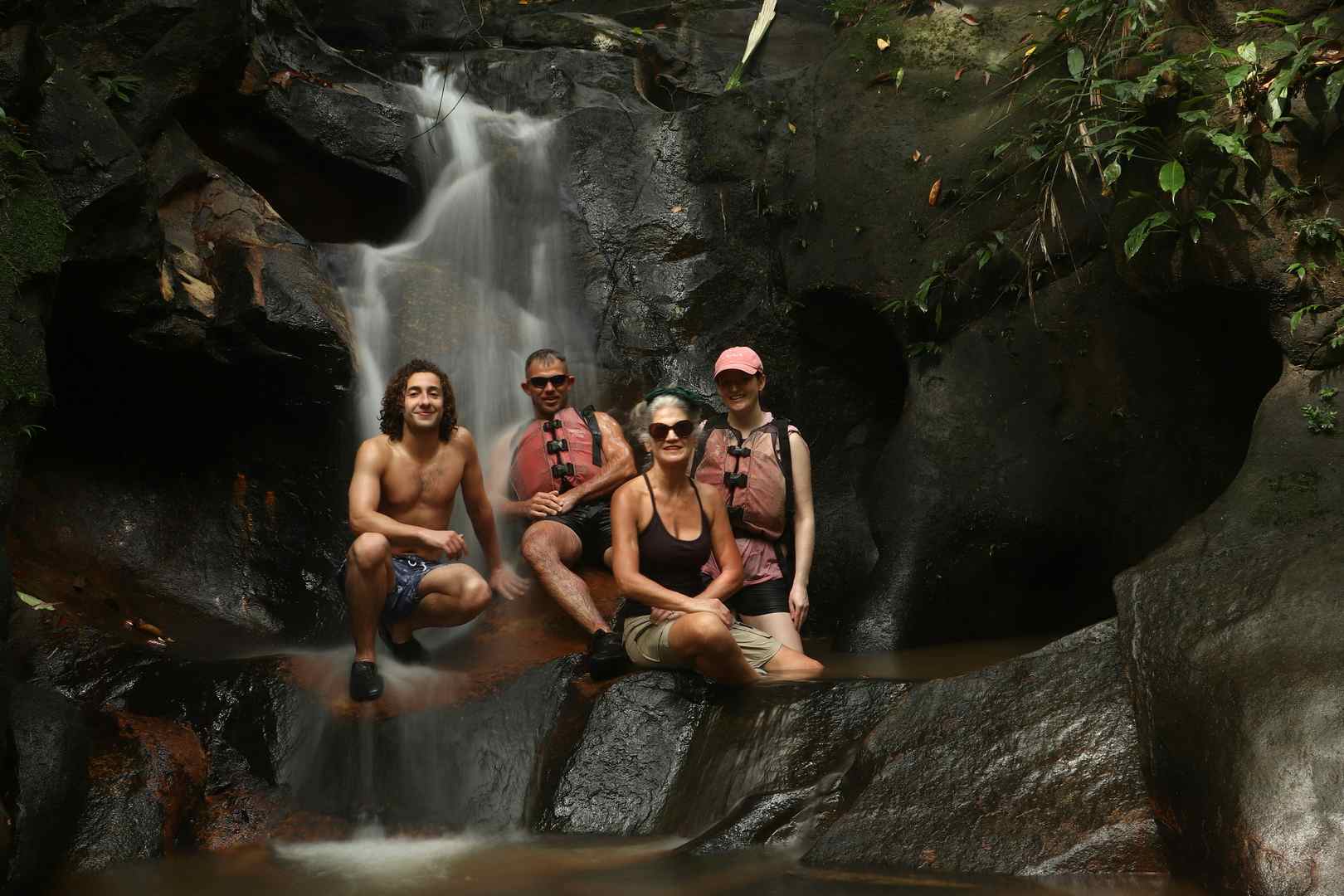
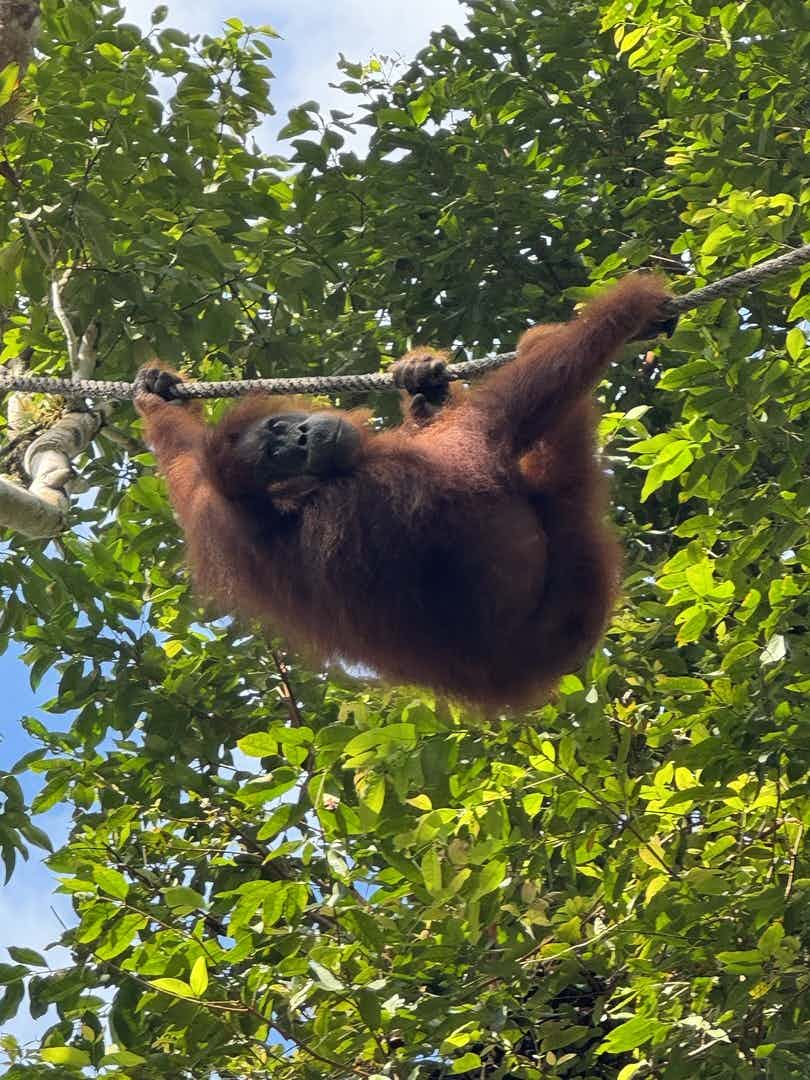
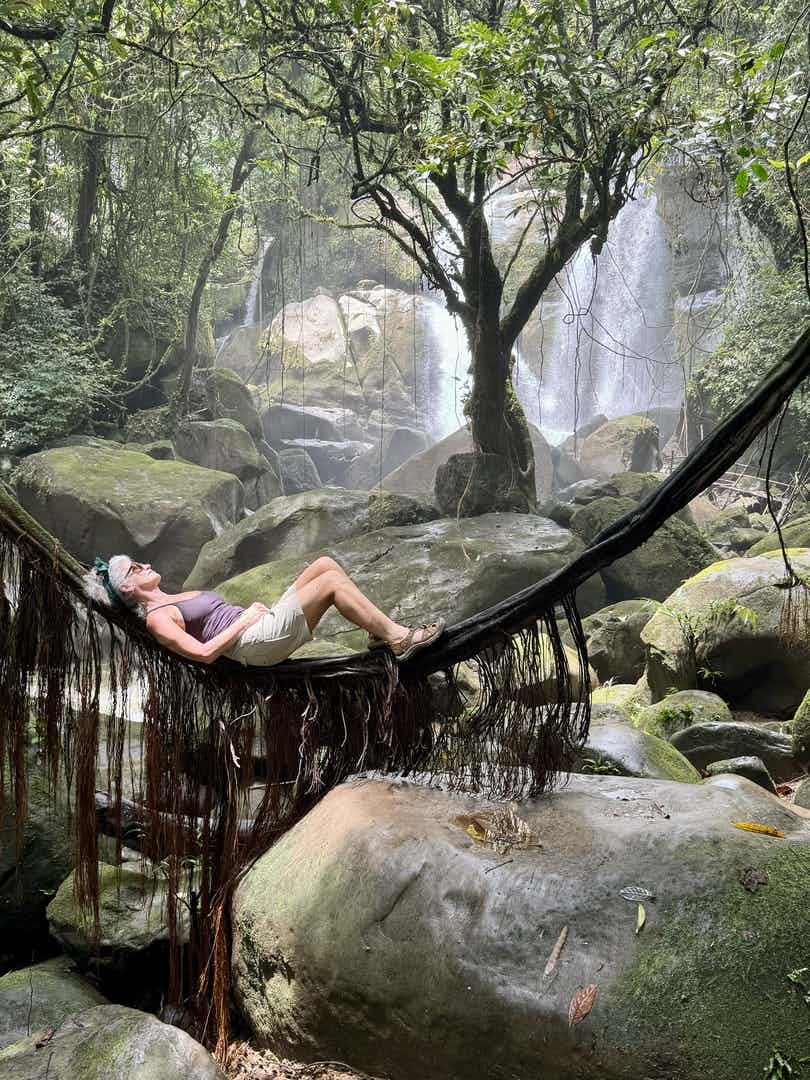
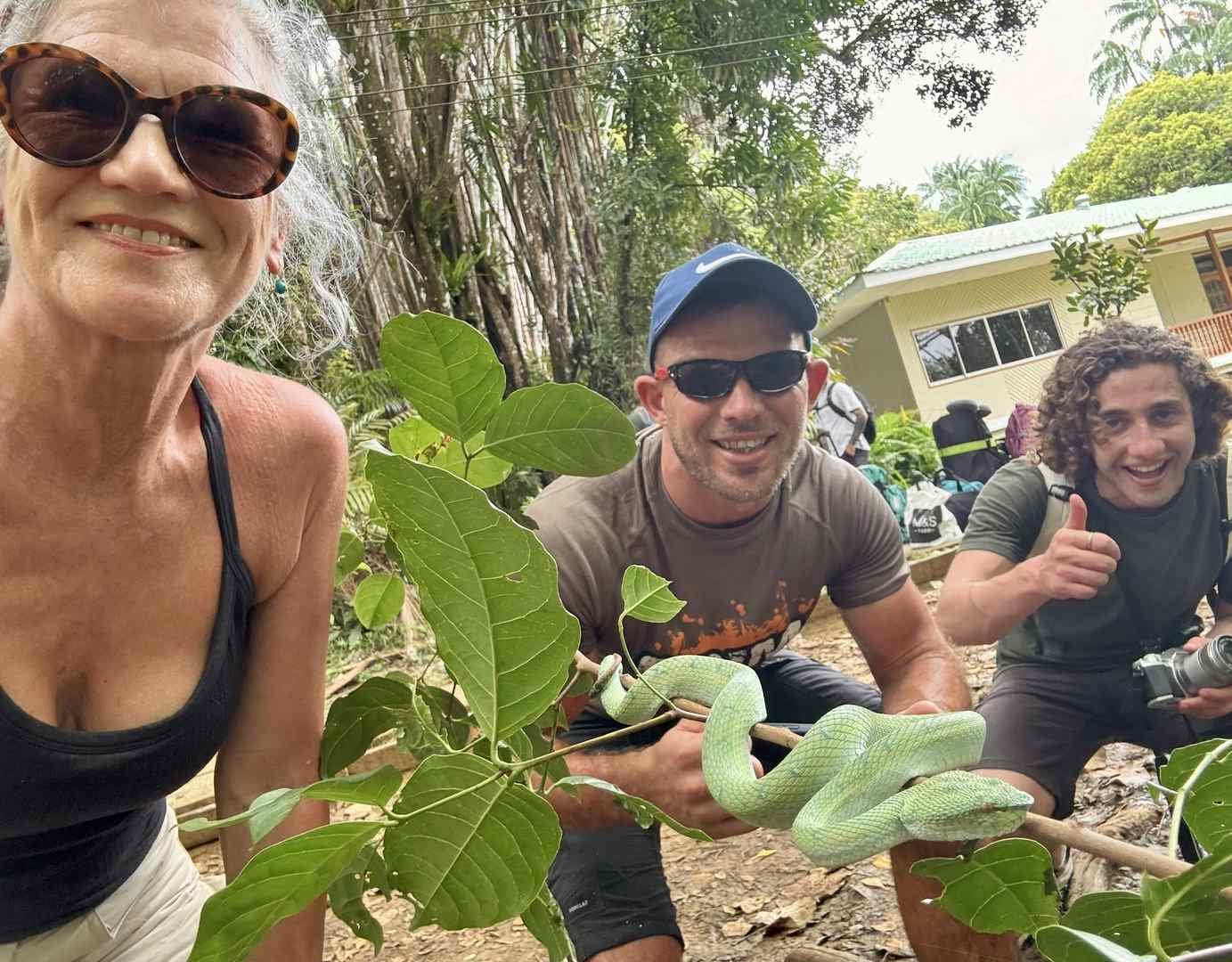
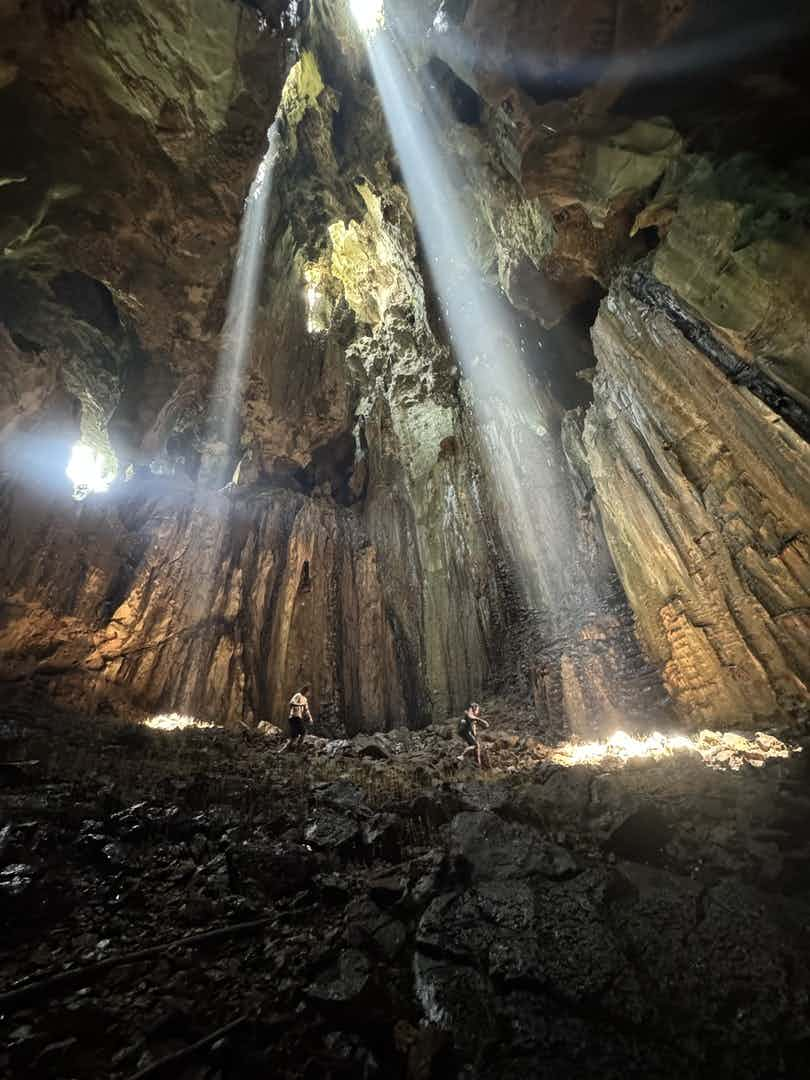
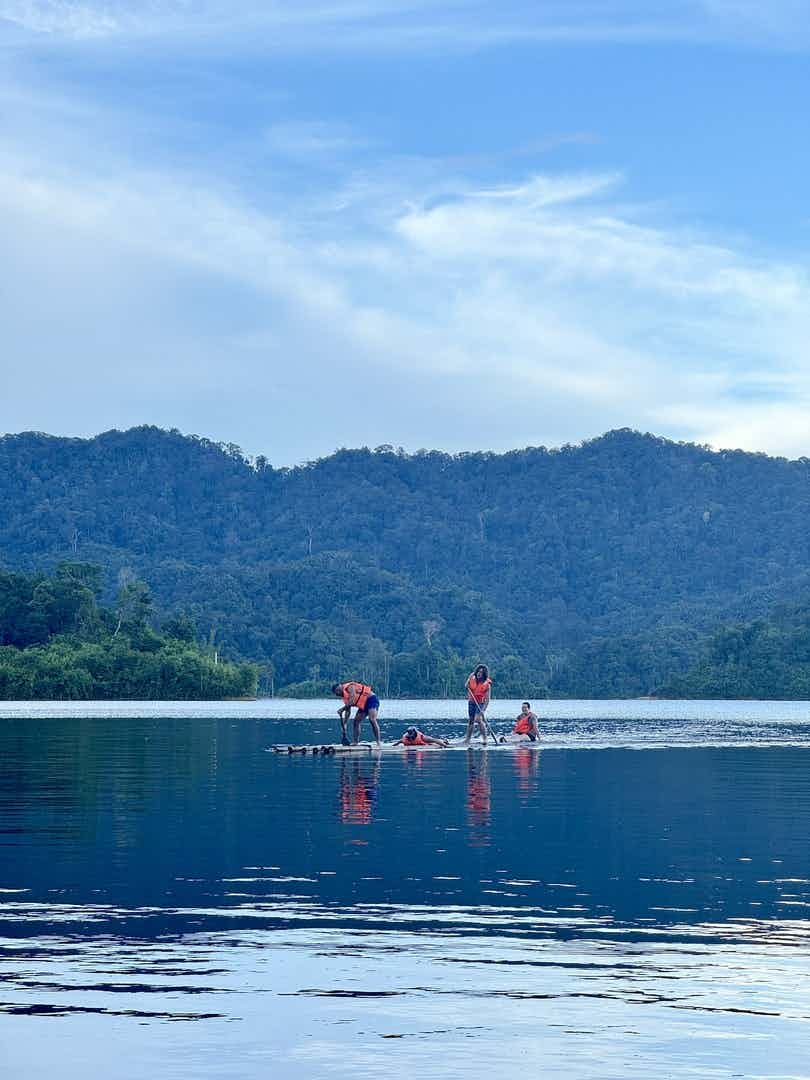
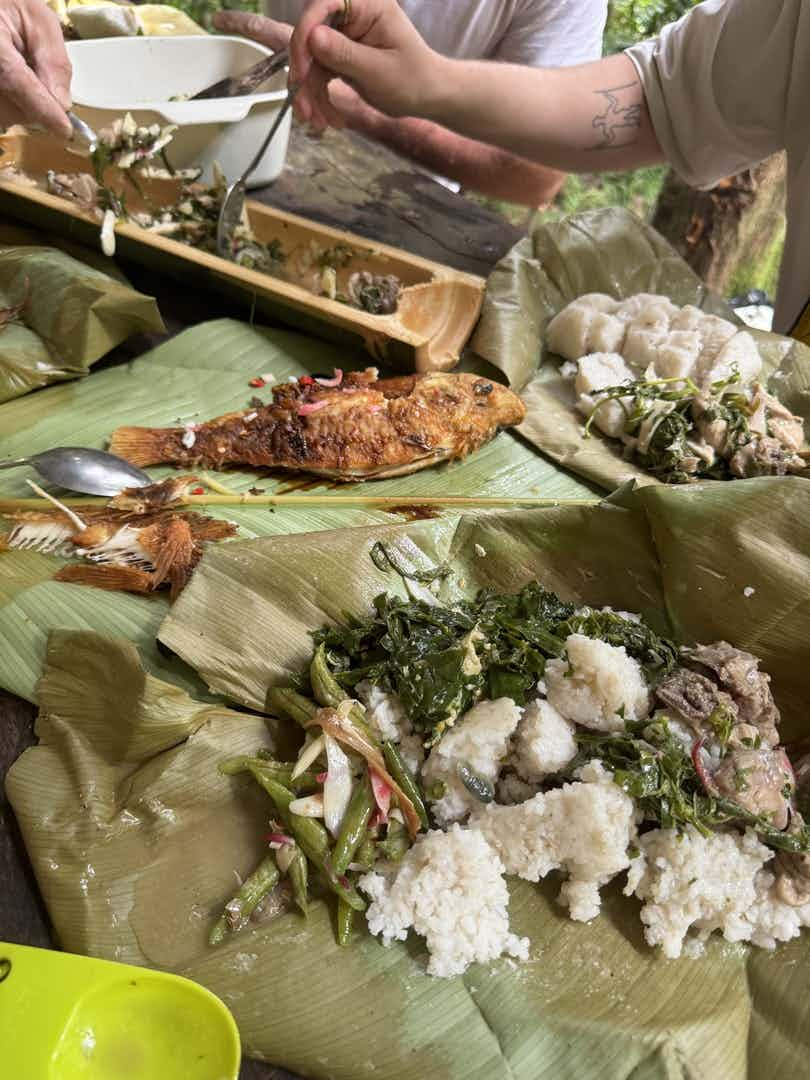
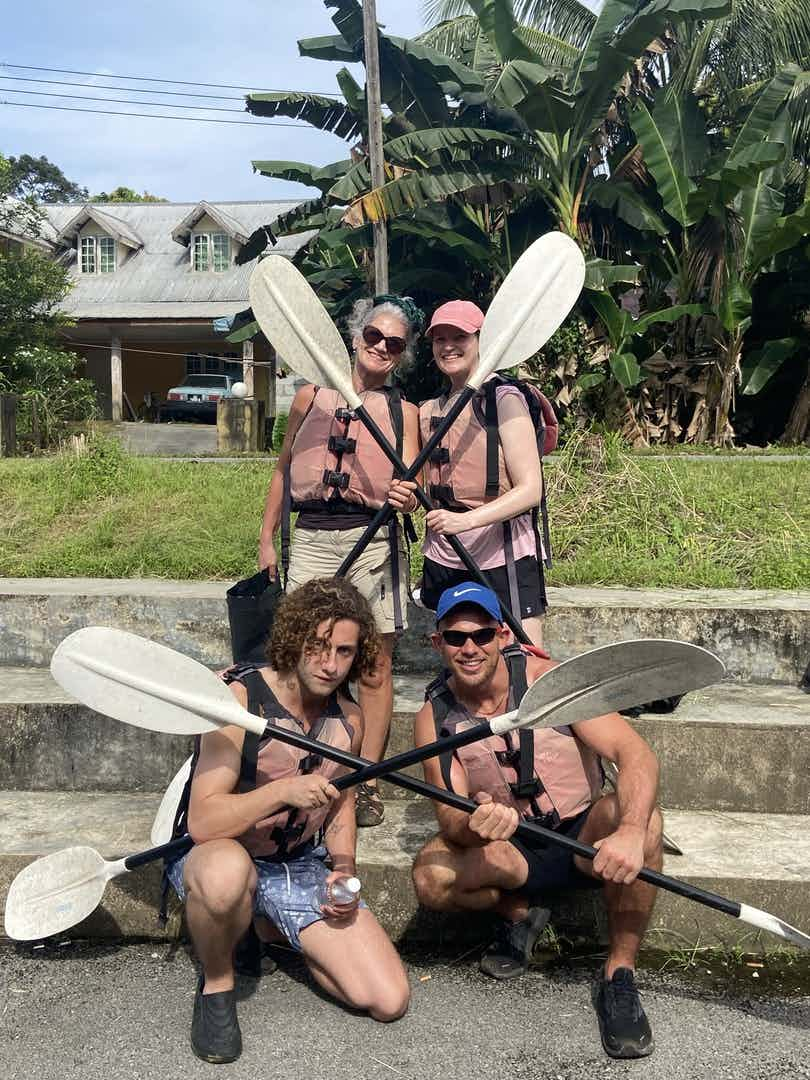
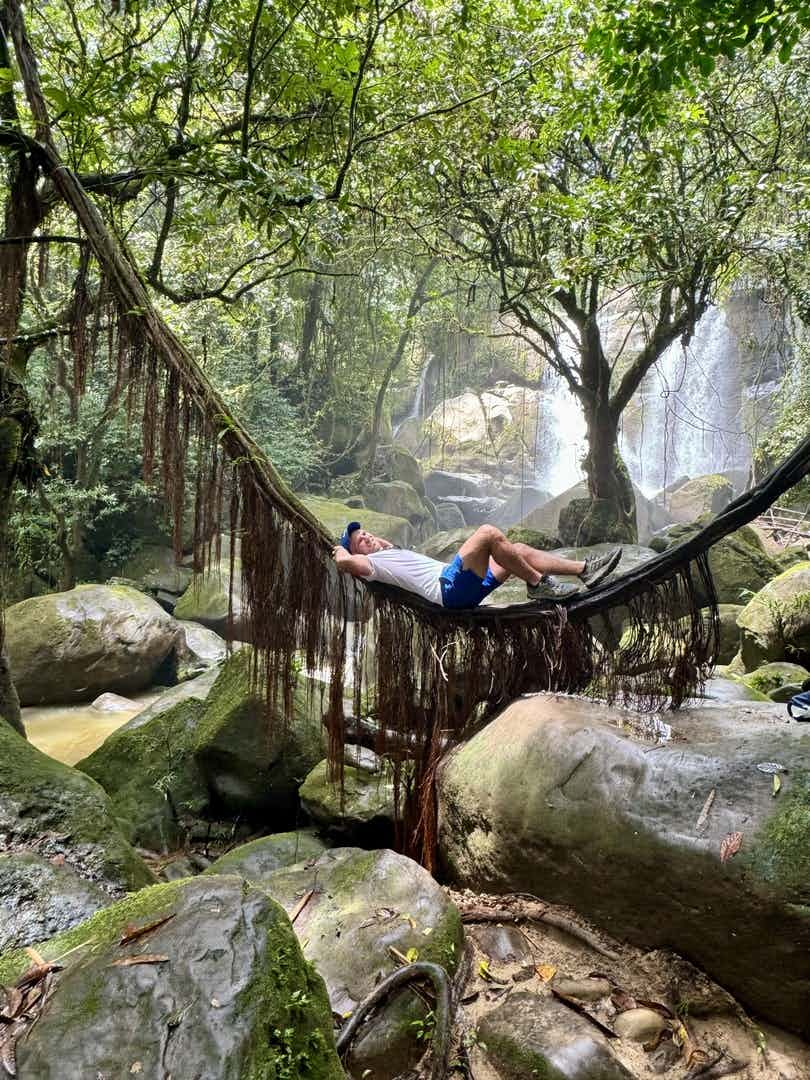
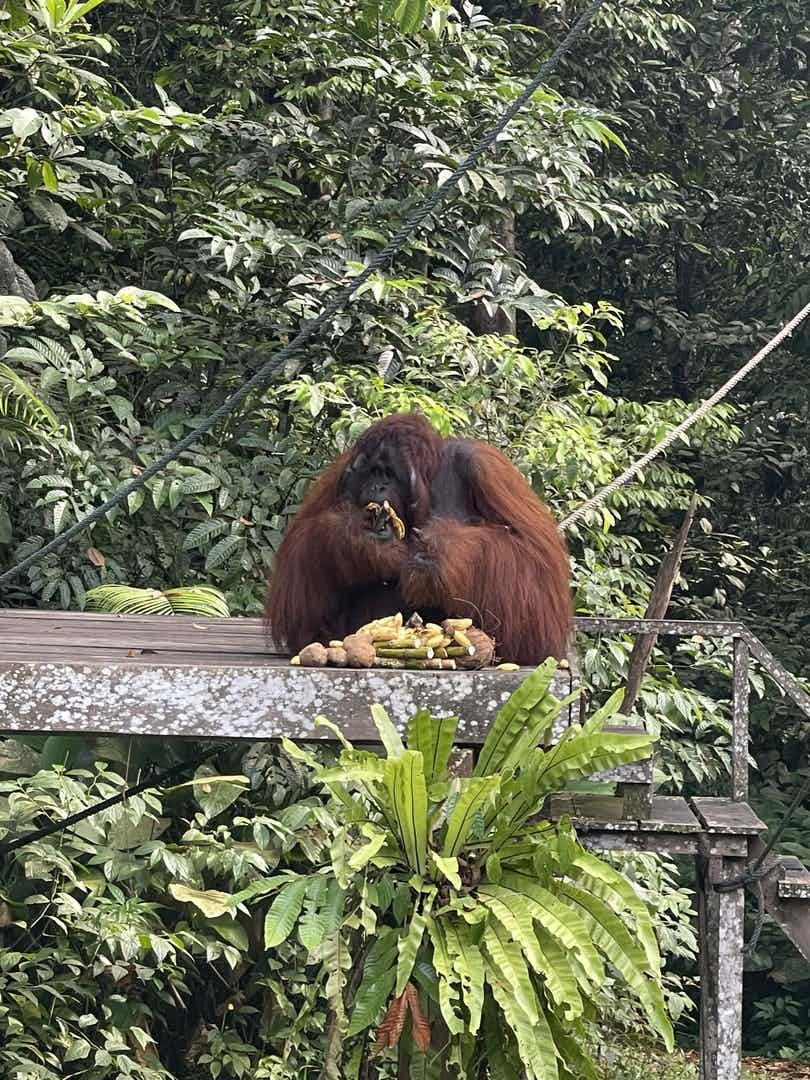







Explore jungles teeming with wildlife, including endemic proboscis monkeys, orangutans and nocturnal creatures
Hike through virgin rainforest to reach sparkling waterfalls, mysterious caves, remote beaches and traditional longhouses
Kayak the untouched Sarawak River and cycle to historic towns as you traverse the spectacular landscapes of Borneo
Drift off to the hum of the jungle at authentic cultural homestays, secluded forest lodges and a tranquil Buddhist village
Key Information
Day 1
Welcome to Borneo!
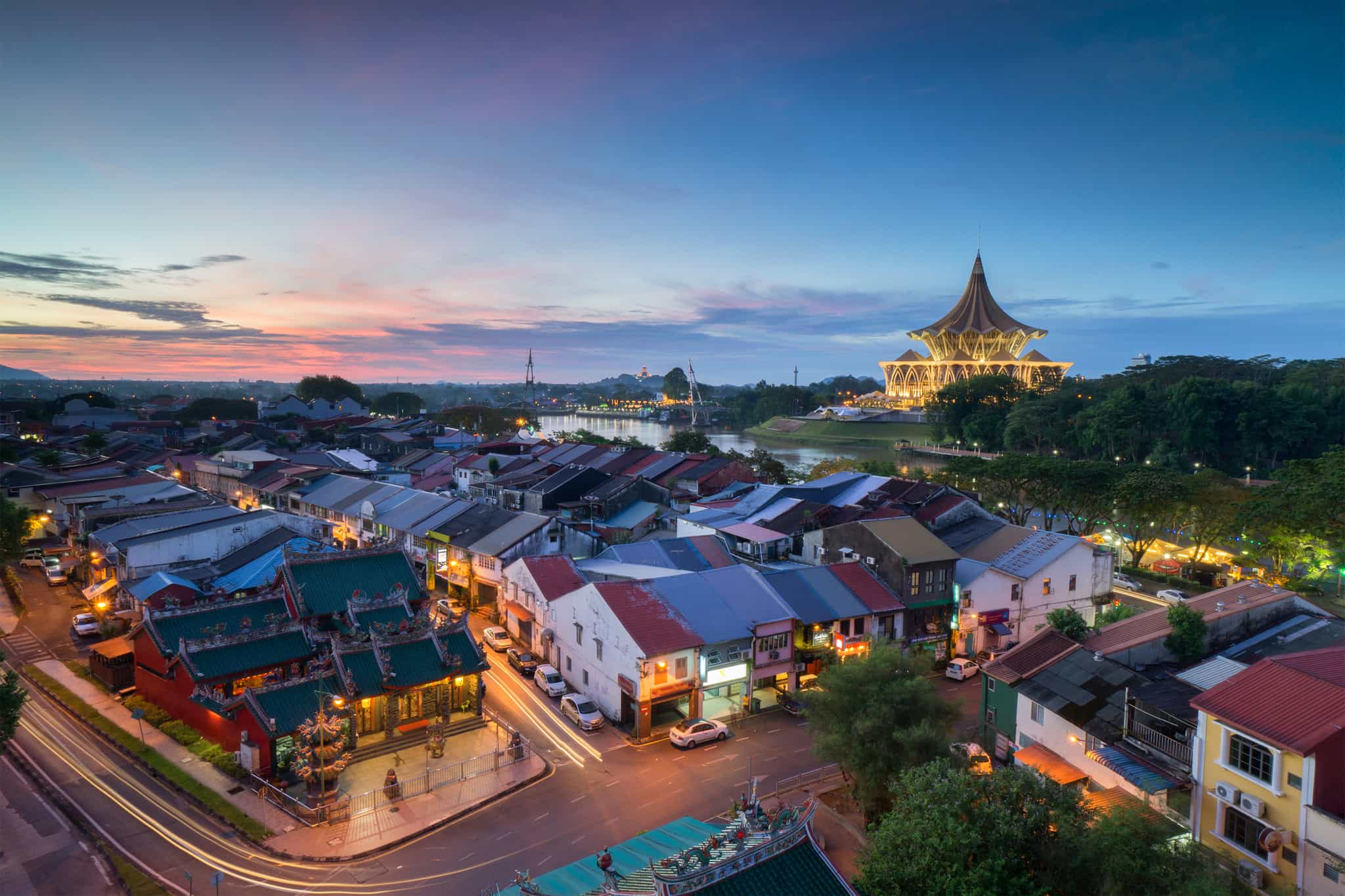
Cycling
Arrive into the state of Sarawak in northwestern Borneo, and transfer to your hotel in Kuching, one of the most beautiful and laid-back cities in Malaysia. If you arrive on an early flight, settle in and relax at the hotel's pool before meeting your guide for an optional ride along the city's heritage trail, cycling through the old bazaars, temples, the central square and along the picturesque waterfront. Continue on to surrounding kampongs (villages) before crossing the waterway in the traditional fashion – on a sampan ferry. Conclude the day with a sunset dinner at the bank of the atmospheric Sarawak River. If you arrive on an evening flight, you can head straight to bed and meet your group on Day 2.
Day 2
Wildlife encounters in Bako National Park
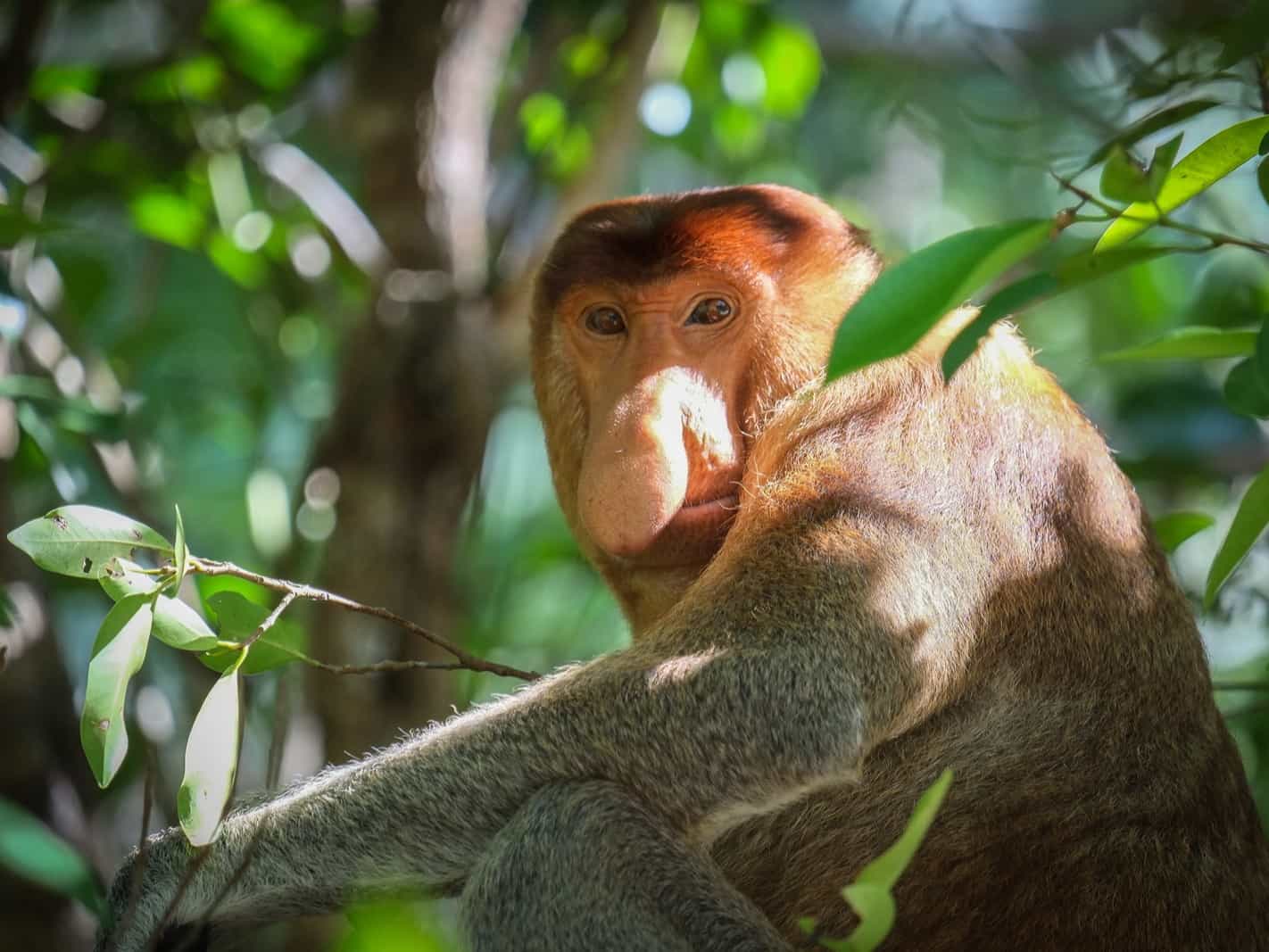
Wildlife Tracking
Today you'll venture into Bako National Park for your first proper introduction to Borneo's lush rainforest and iconic wildlife. Led by an expert park guide, you'll walk the extensive maze of jungle trails amongst distinct ecosystems, from mixed dipterocarp and mangrove forests to leafy beach and cliff vegetation overlooking the picturesque coastline. Keep your eyes open for silver-leaf monkeys, long-tailed macaques, monitor lizards, bearded pigs, a variety of colourful birdlife and the endemic proboscis monkeys. After dinner, head out on a night-time stroll in search of nocturnal animals before spending your first peaceful night in the jungle.
Day 3
Silabur Jade Cave and Mongkos Longhouse
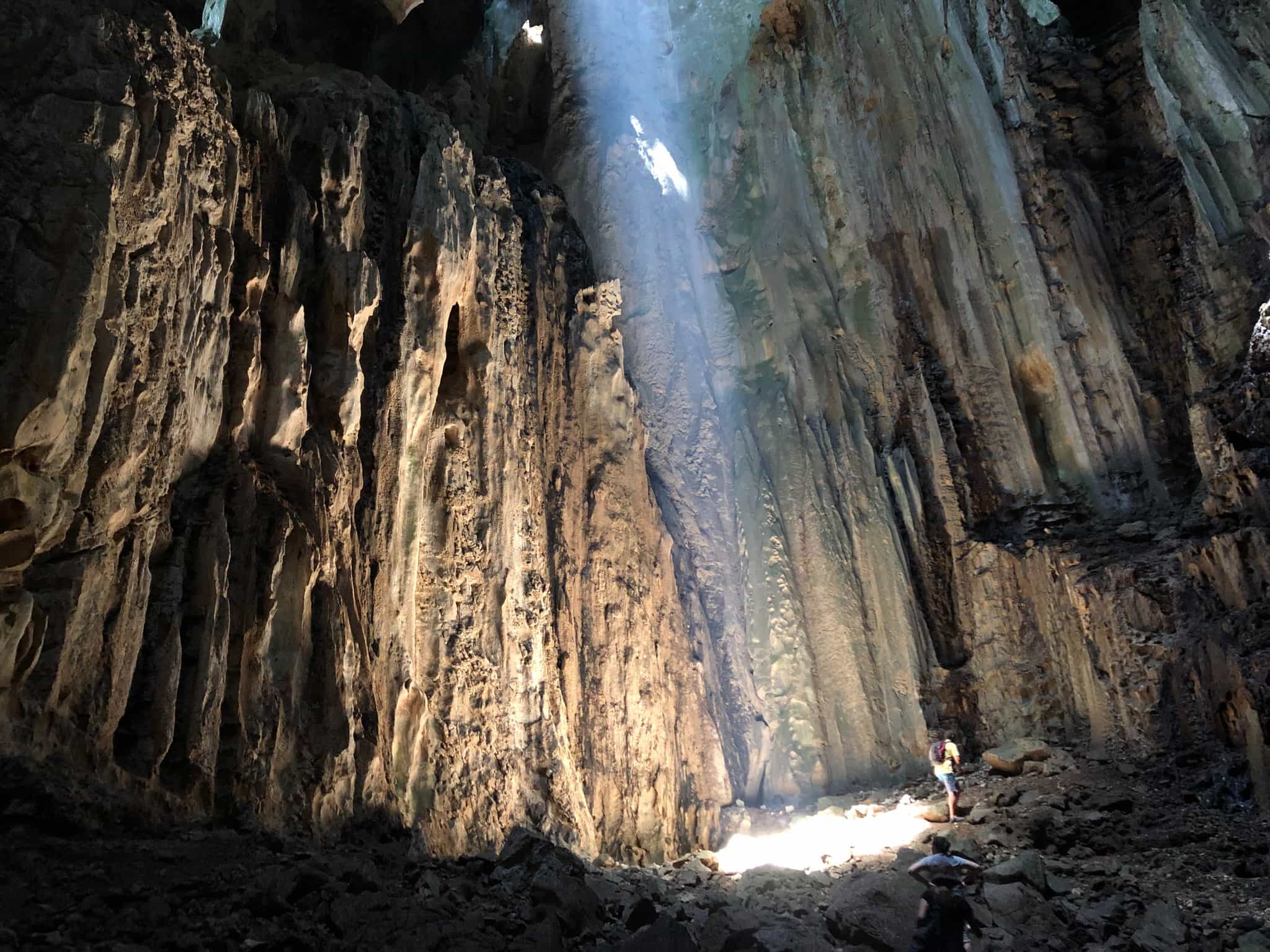
Driving
Caving
Hiking
Rise early and jump into the van for a two hour transfer to Lobang Batu, a Bidayuh village near the border with Indonesian Borneo. Meet the local community guides, and trek to the entrance of Silabur Cave, one of island's most breathtaking natural wonders. Get your torch lights ready and venture deep into the enormous limestone cave system, where occasional sun rays beam down through cracks and holes in the cavernous roof. In the afternoon, you'll meet the indigenous community of Kampong Mongkos, home to one of the few remaining traditional longhouses in Sarawak. Wander around the village and see daily life in this remote farming location, then settle in for the night – resting the traditional way, on the corridor floor of the 24-door bamboo longhouse.
Day 4
Bengoh Waterfalls trek
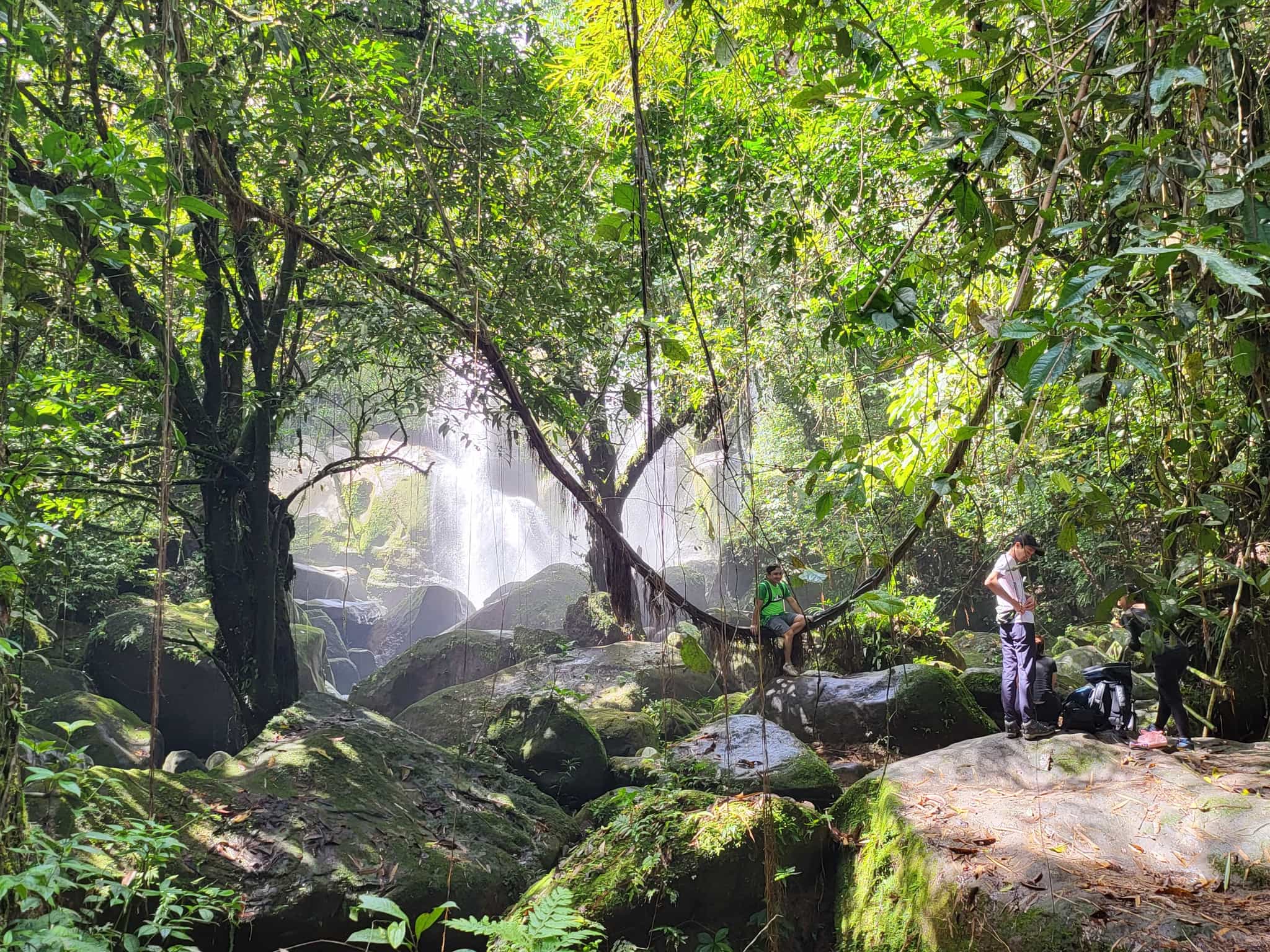
Hiking
Say goodbye to your hosts after breakfast and drive to Bengoh Dam jetty (about 90 minutes drive) for a short, exciting boat ride across a tranquil lake surrounded by mountains. Then set off on a spectacular hike to a series of secluded waterfalls immersed in the virgin jungle - think lush greenery, dense forest, pristine wildflowers... it's often likened to Jurassic Park. Sunbathe on giant rocks, take a cool dip in the crystal-clear pools and learn the Dayak culinary arts as you cook with bamboo harvested from the jungle. End your day with an authentic homestay experience at Bidayuh village in Kampung Kandung, overlooking the emerald Bengoh Lake. Rest, relax and tuck into a homemade meal as you watch the sun slowly sink behind the mountains.
Day 5
Kayak and cycle to historic Siniawan

Kayaking
Cycling
Get ready for another adventure-packed day, paddling and pedalling through Borneo's incredible landscape. Float down an untouched stretch of the Sarawak River, kayaking through the rainforest in the shade of overhanging canopies and the sound of chirping insects and birds. Reach a secluded basecamp for a delicious lunch, then hop on the saddle and cycle through lush greenery and spectacular limestone karst landscape to historic Siniawan, a former gold mining town that has retained its traditional wooden buildings for well over a century. Savour some local specialities and taste some local craft beer in the village's old streets before calling it a night. Tonight you'll sleep in a tranquil Buddhist village nearby.
Day 6
Orangutan spotting and hiking in Kubah National Park
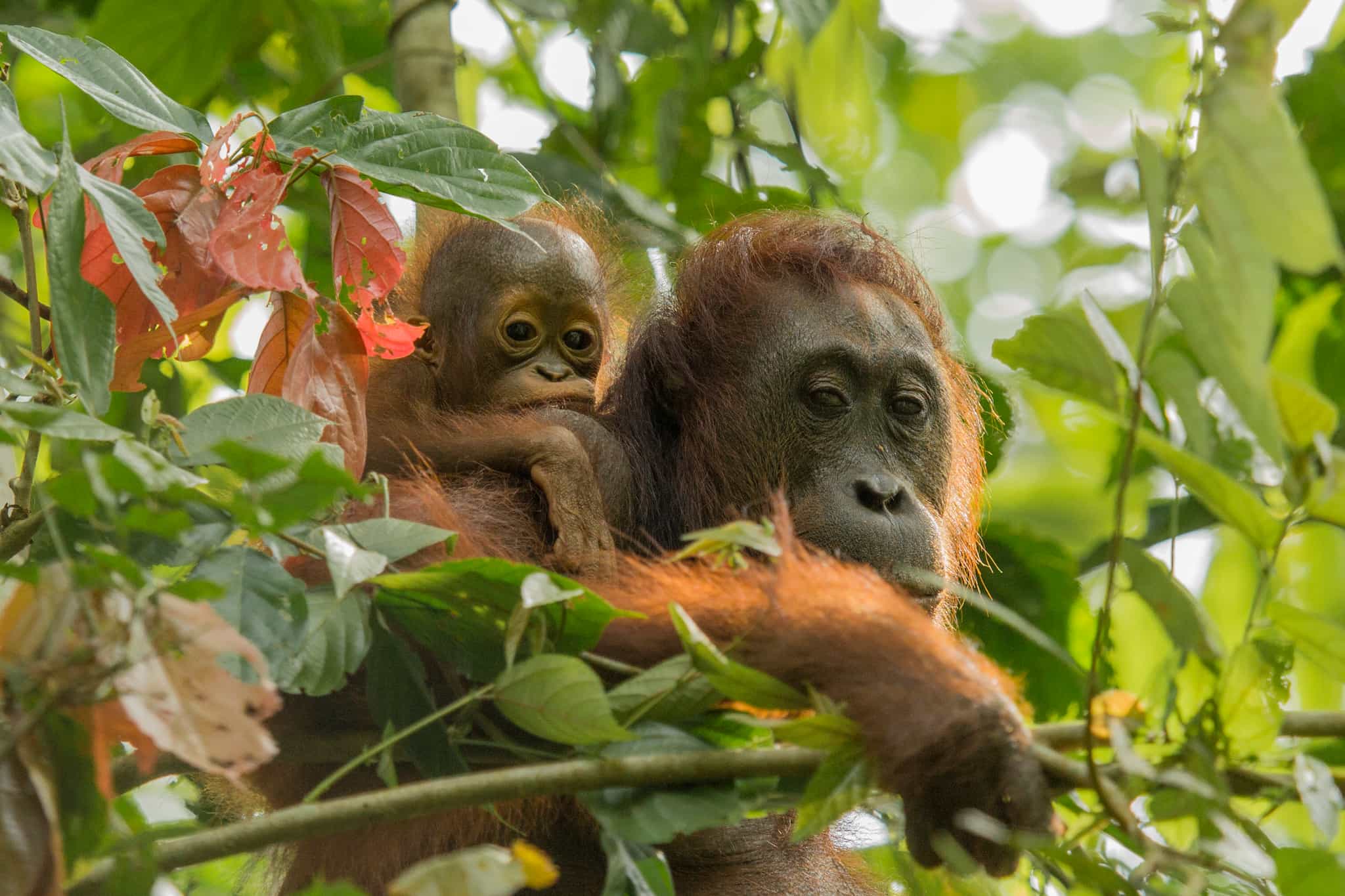
Hiking
Fuel up on a delicious vegetarian breakfast ready for your visit to the Semenggoh Nature Reserve, an important primate rehabilitation centre which shelters a thriving community of endangered orangutans. Since the semi-wild primates are free to roam in a large protected forest area, there’s no guarantee of a sighting, but they regularly descend from the canopy by the trails during daily supplemental feedings. After your visit, hit the road for an hour to reach the jungle trails of Kubah National Park for a spectacular hike through some of the most pristine tropical rainforest in Sarawak – eyes peeled for crystal-clear jungle streams, rare orchids, palm trees and carnivorous pitcher plants. If you still have energy after dinner, join your guide to experience the darkness of the rainforest and track unique frog species at night.
Day 7
Tanjung Datu: where the jungle meets the sea
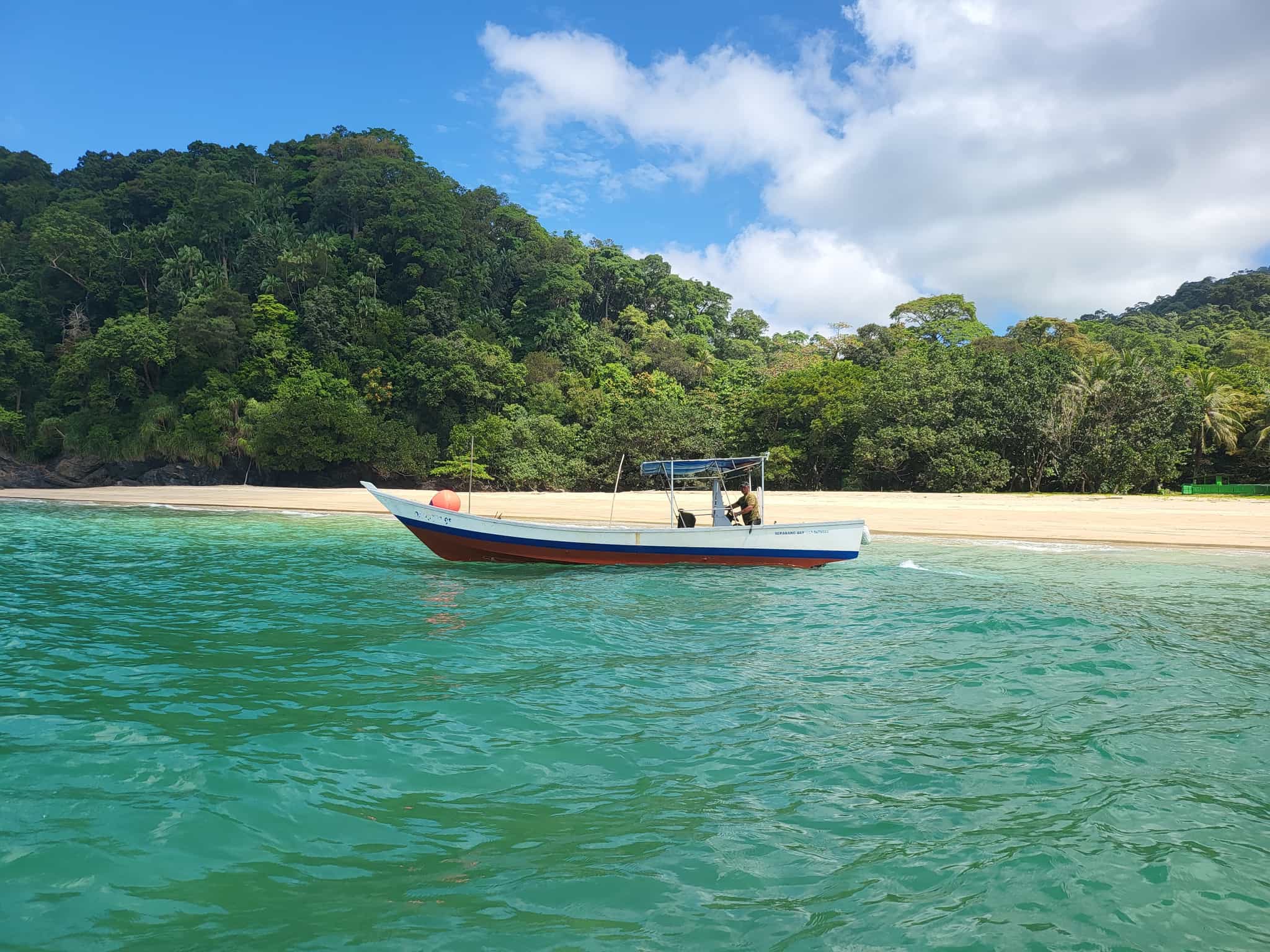
Driving
Hiking
Boat Ride
After breakfast, you'll travel by road and boat for a couple of hours to reach the remote Tanjung Datu National Park, a hidden slice of paradise in the most westerly tip of the island, nicknamed the 'Heaven of Borneo’. Here, rugged mountains and lush rainforest sweep down to clear turquoise seas. Visit the park's turtle hatchery and learn about the local turtle conservation program, before hiking through pristine forest to reach Antu Laut beach where you can enjoy a refreshing swim and admire the huge boulders that dot the coast. Spend the rest of your day relaxing on the beach, swimming or snorkelling Telok Upas with colourful patches of corals just offshore. Settle into simple camping shelters and if you are lucky, watch the turtles nesting at night (sightings are common from April to October).
Day 8
Borneo's rainforest getaway
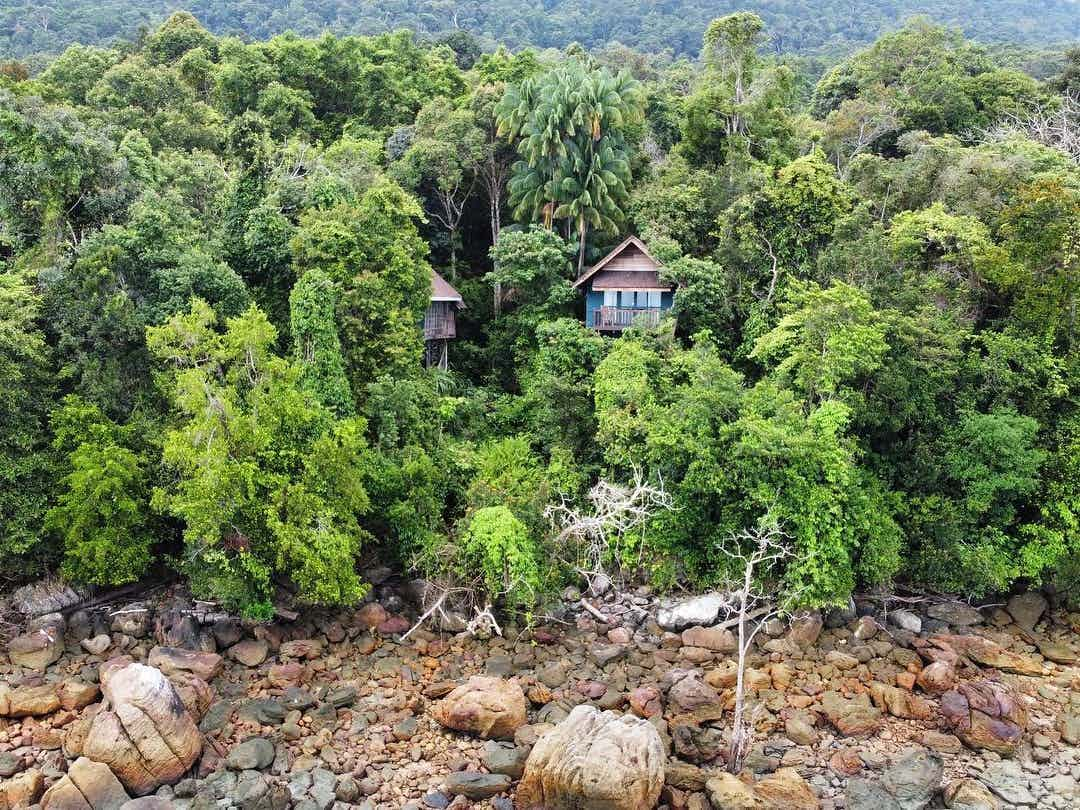
Hiking
Driving
This morning, enjoy another short hike amongst the pristine beauty of Tanjung Datu, walking along picturesque bays and white sandy beaches – eyes open for pig-tailed macaques and Bornean bearded pigs. Grab lunch in a fishing village, then transfer by road (3 hours) to a secluded eco-lodge nestled in the lush foliage of the Damai Peninsula, dominated by the rainforest-clad slopes of Mount Santubong. Enjoy some well-earned downtime at the resort's beach and catch a beautiful sunset. Tonight, lay back in your cabin and listen to the rainforest come alive with the sounds of insects and frogs.
Day 9
The pristine Santubong Peninsula
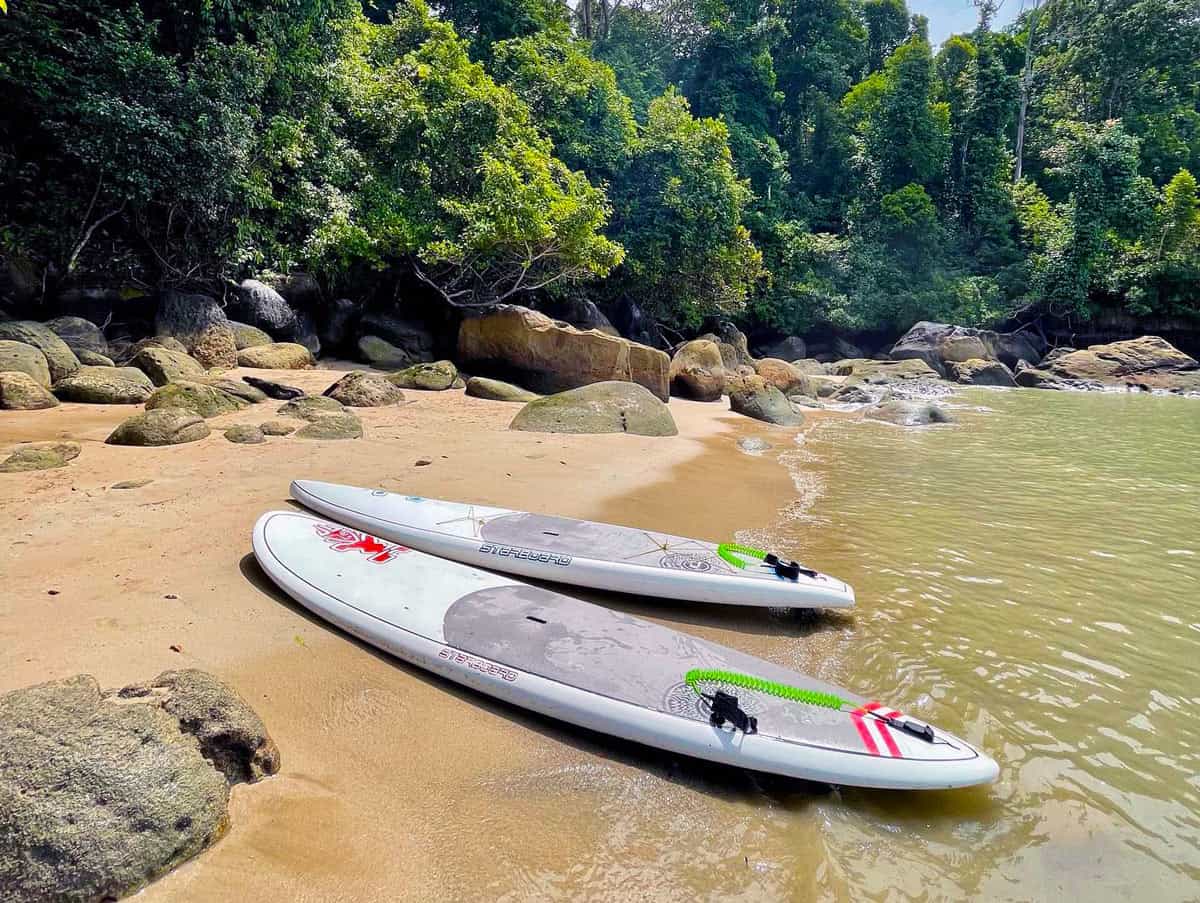
The Santubong Peninsula is such a beautiful spot – so kick back and enjoy it. Indulge in a relaxed breakfast and then do as you please for the rest of the day – perhaps hit the trails surrounding the lodge and explore the mangrove jungle at your own pace, sunbathe on a private white beach, or grab a paddle for some ocean SUPing or kayaking. You could tackle a challenging climb to Mount Santubong (810m) across rope ladders and dense jungle, venture out to the protected Satang Turtle Island in Talang-Satang National Park for some amazing snorkelling or try to spot Irrawaddy dolphins on a relaxing morning wetland cruise around the Santubong Peninsula. Tonight you'll celebrate the end of your epic adventure with a farewell seafood dinner before falling asleep, serenaded by the hum of the forest, one last time.
Day 10
Bid farewell to Borneo!
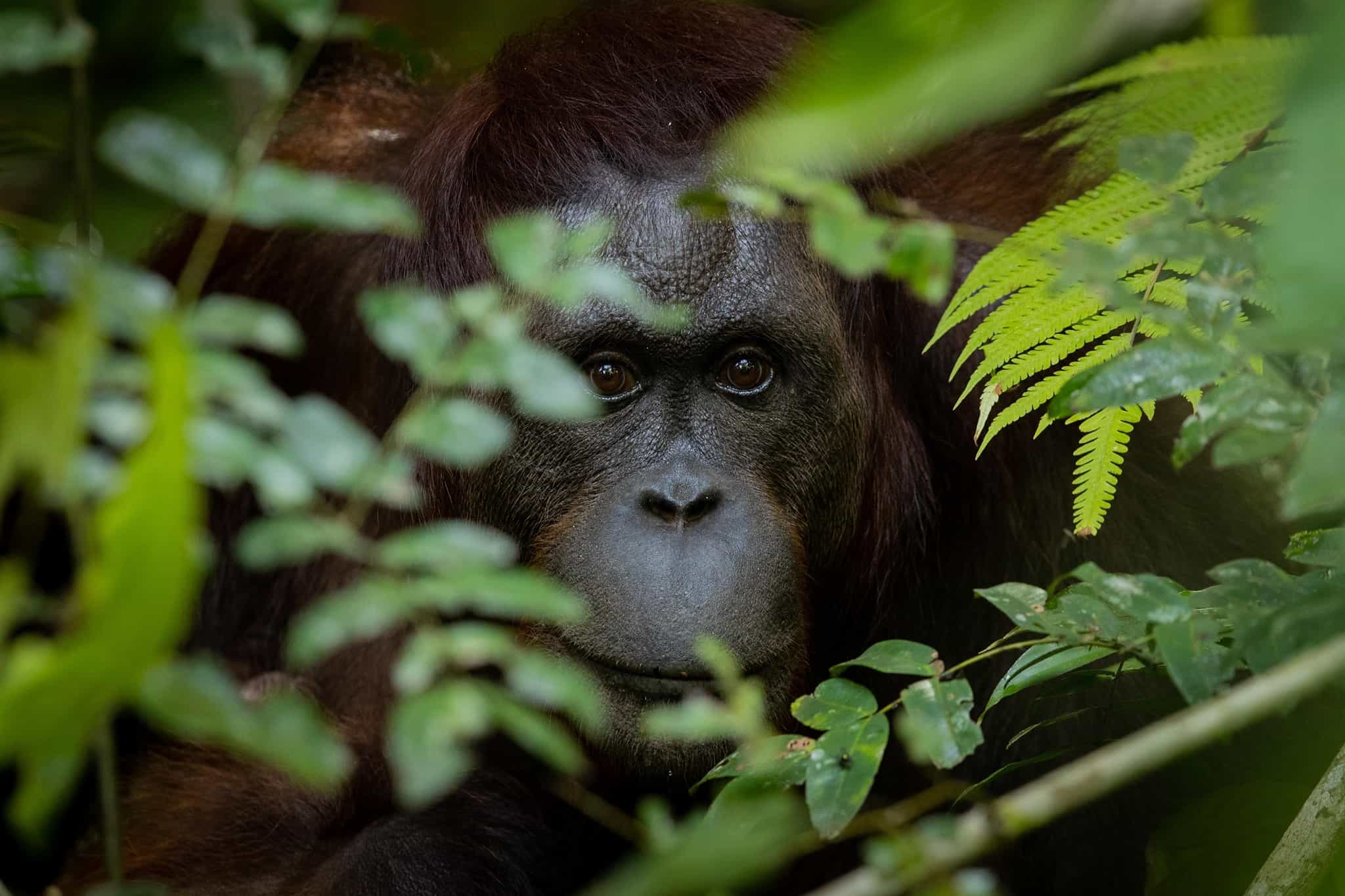
Your adventure ends today as you enjoy a final breakfast before transferring to Kuching Airport in time for your onward journey.
Day 1
Breakfast
Lunch
Dinner
Day 2
Breakfast
Lunch
Dinner
Day 3
Breakfast
Lunch
Dinner
Day 4
Breakfast
Lunch
Dinner
Day 5
Breakfast
Lunch
Dinner
Day 6
Breakfast
Lunch
Dinner
Day 7
Breakfast
Lunch
Dinner
Day 8
Breakfast
Lunch
Dinner
Day 9
Breakfast
Lunch
Dinner
Day 10
Breakfast
Lunch
Dinner
What is the food like?
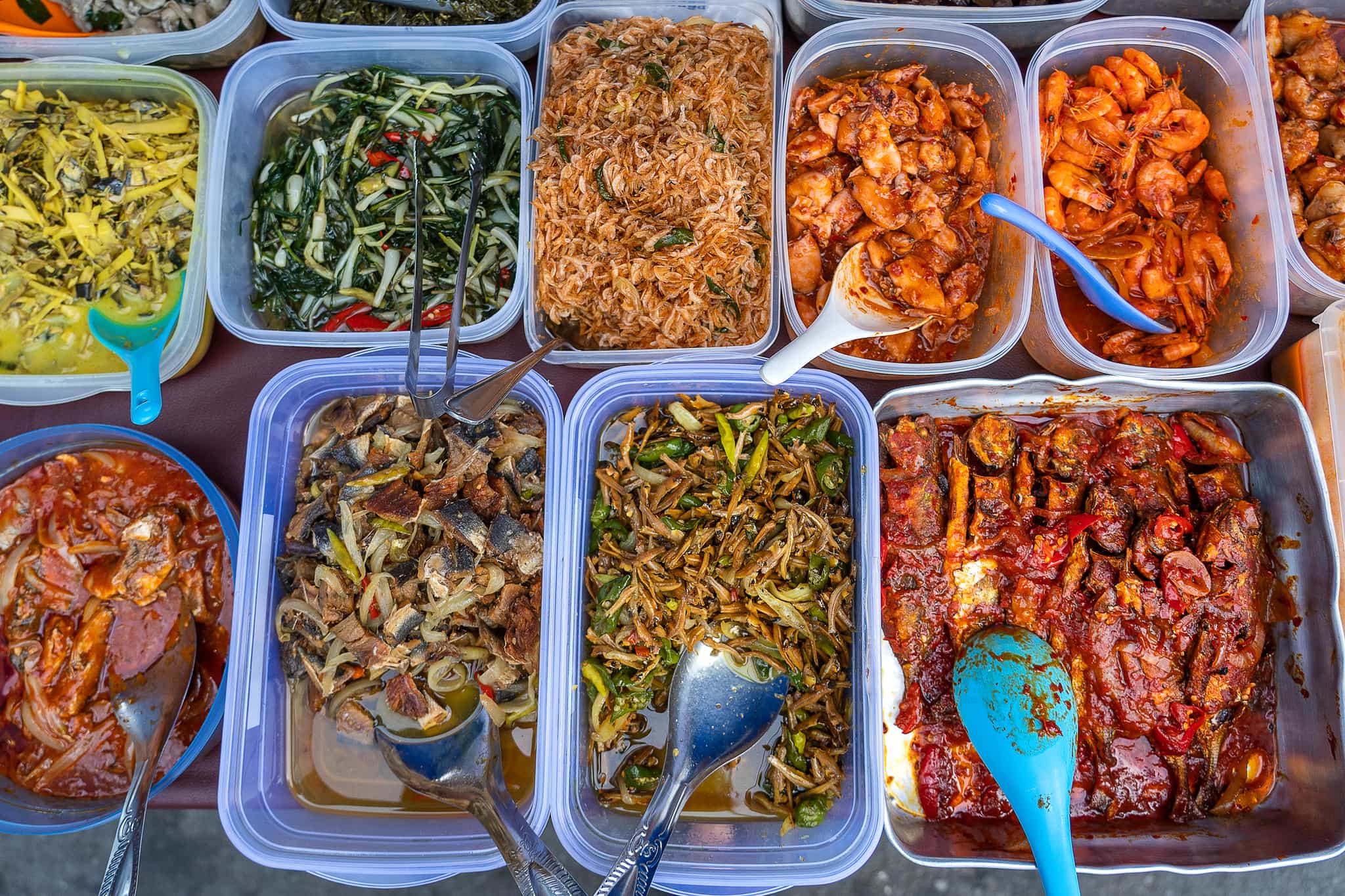
The Malaysian part of Borneo is an ethnic melting pot of Chinese, Malaysian, and indigenous peoples who have coexisted on the island for centuries. The result is a spectacular variety of spices and flavours that influence the local cuisine. Borneo staples include grilled fish, barbecued prawns, fried rice, noodles, and local vegetables seasoned with garlic, ginger, and rich sauces. The rainforest provides many of the locals' favourite treats, including durian (a tropical fruit with a pungent smell) and the rambutan (a juicy, sweet fruit similar to a lychee). Fish- and chicken-based soups with noodles cooked in a hot clay pot are very traditional.
Vegetarians, vegans and other dietary requirements and allergies can be catered for though many dishes contain oyster/fish/soy sauce, shrimp paste and egg so options may be limited - please just request this on your passenger info form.
What is the accommodation like?
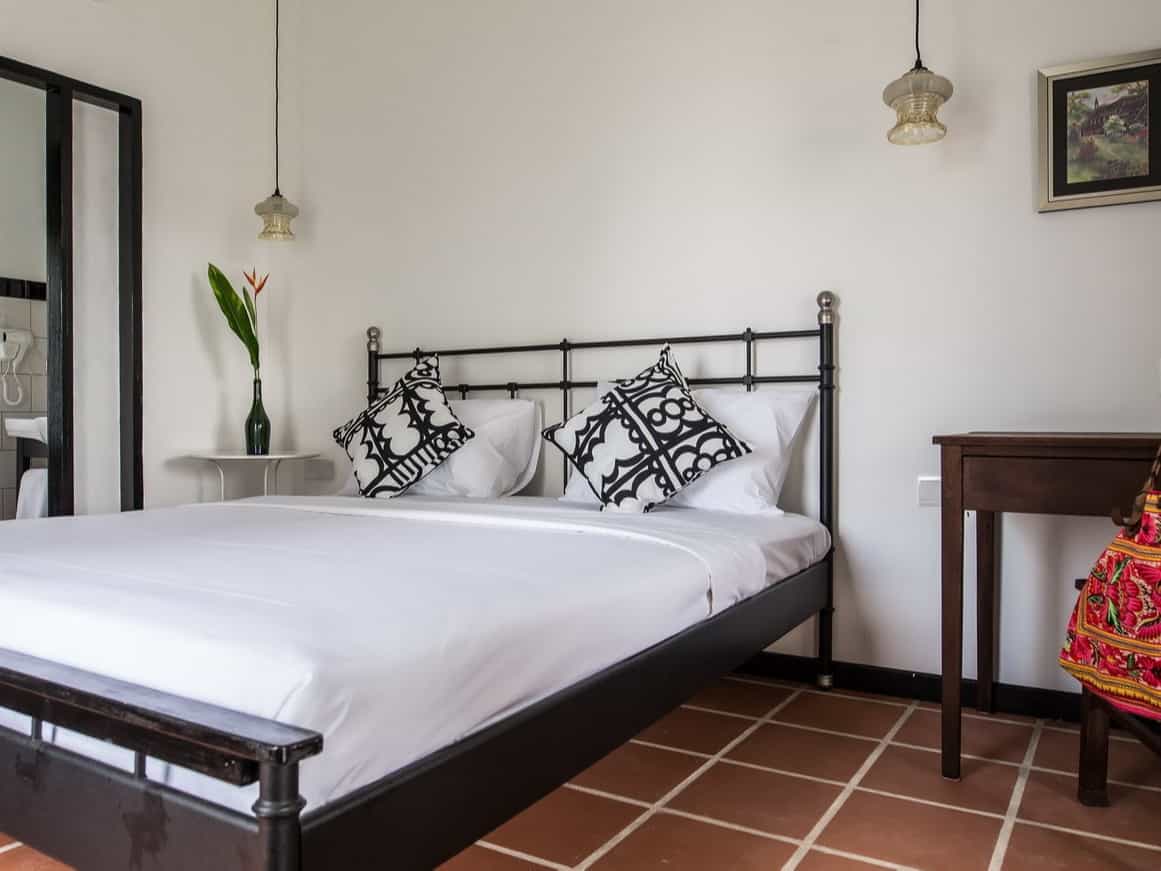
Kuching
You'll spend the first night in the heart of Kuching's historic centre, just a stone's throw away from the riverside, the main bazaar and old Chinatown. You'll usually stay at the Marian Hotel, a boutique lodge with a heritage flavour which has an outdoor pool and a gorgeous sunken garden. Accommodation is in en suite, twin-share rooms with air-conditioning.
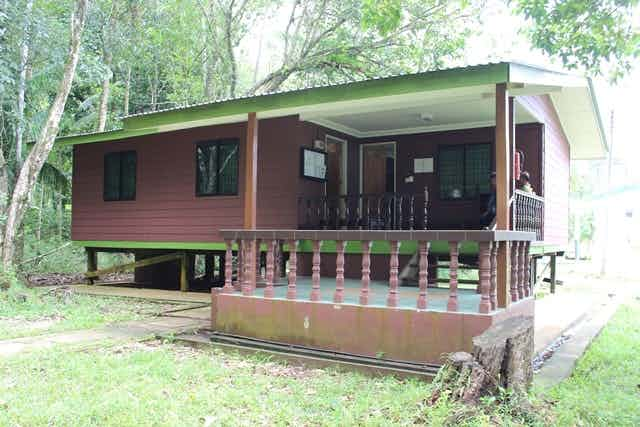
Bako National Park
Immerse yourself in the jungle for a night in Bako National Park, with the opportunity to walk among the rainforest surroundings and track wildlife at night. Accommodation is basic but comfortable and consists of simple chalets and lodge rooms. The rooms have either a shared or en suite cold water shower and toilet, and are also equipped with fans. The room type is usually same-sex twin or triple-share but occasionally, subject to availability, you may be accommodated in larger rooms with up to four people in order to secure the overnight stay for the whole group.
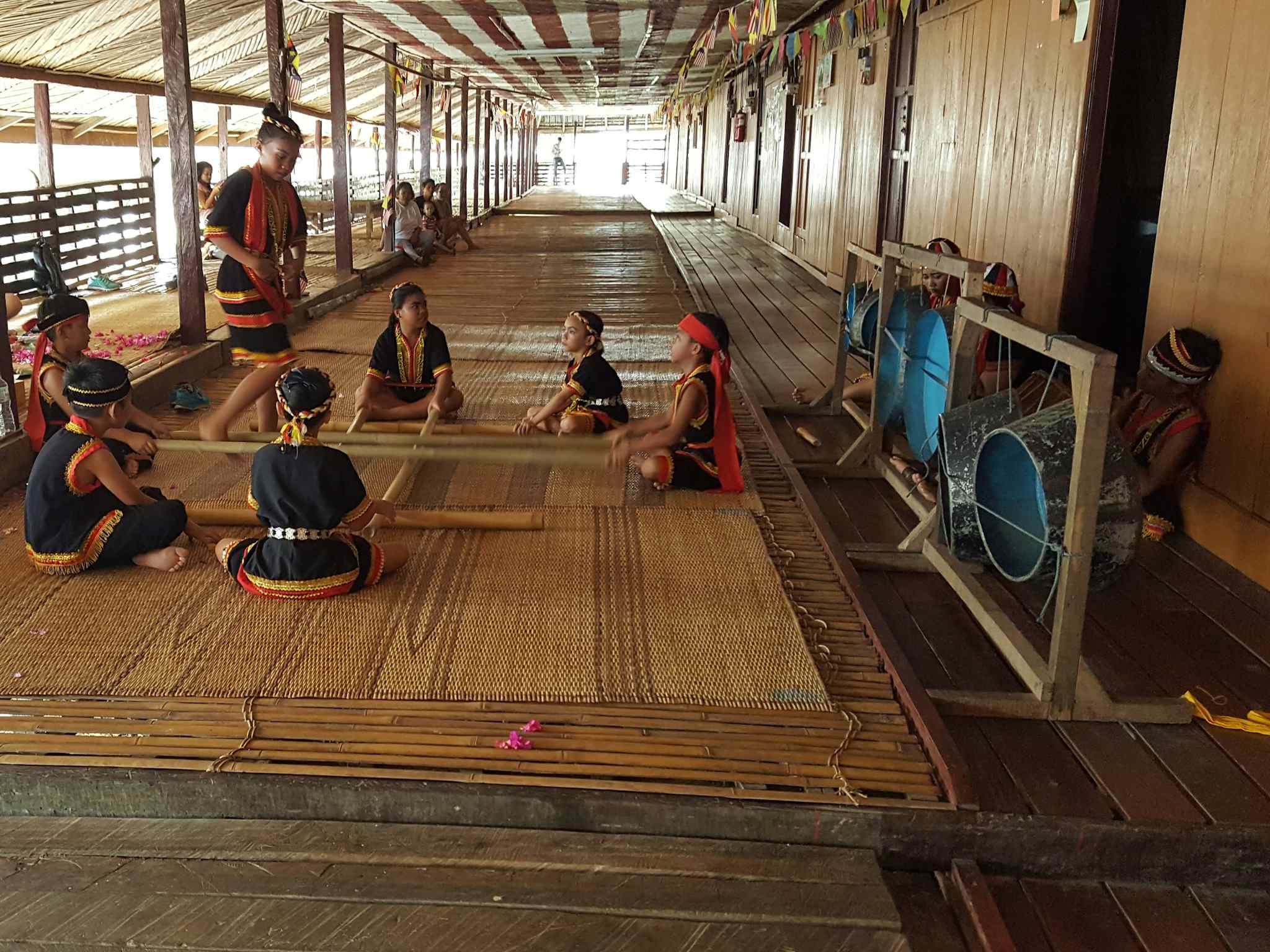
Village homestays
In Kampong Mongkos, you'll experience a unique cultural immersion when you are hosted by a thriving rural community, home to one of the few traditional Bidayuh longhouses that remain in Sarawak. You'll stay in a 24-door bamboo longhouse, enjoy a Bidayuh-style dinner and sleep the traditional way on the Ruai (common corridor). Longhouse hospitality is from the heart, but the facilities tend to be fairly simple: be prepared to eat while seated on the floor, and sleep on a mattress under a mosquito net.
In Kampung Sting, you'll be hosted by the friendly Bidayuh villagers, an indigenous group who thrive on the natural wealth of the tropical rainforest, fruit orchards and pepper plantation. Needless to say, the home-cooked meals here are very fresh. The homes are simple with private, multi-share rooms which floor mattresses with linen, blankets, and mosquito netting. All toilets and showers are communal.
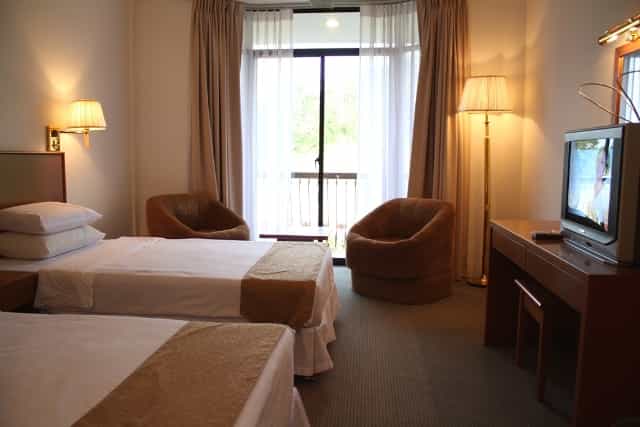
KBS Buddhist Village
You'll spend one night in Kuching New Buddhist Village, a project run by a local NGO. You'll sleep in a hotel that offers comfortable twin-share rooms with air conditioning, a hot shower and an en suite toilet. Enjoy the tranquil gardens surrounding the property, including a spectacular nine-storey pagoda which you can climb up to in your free time.
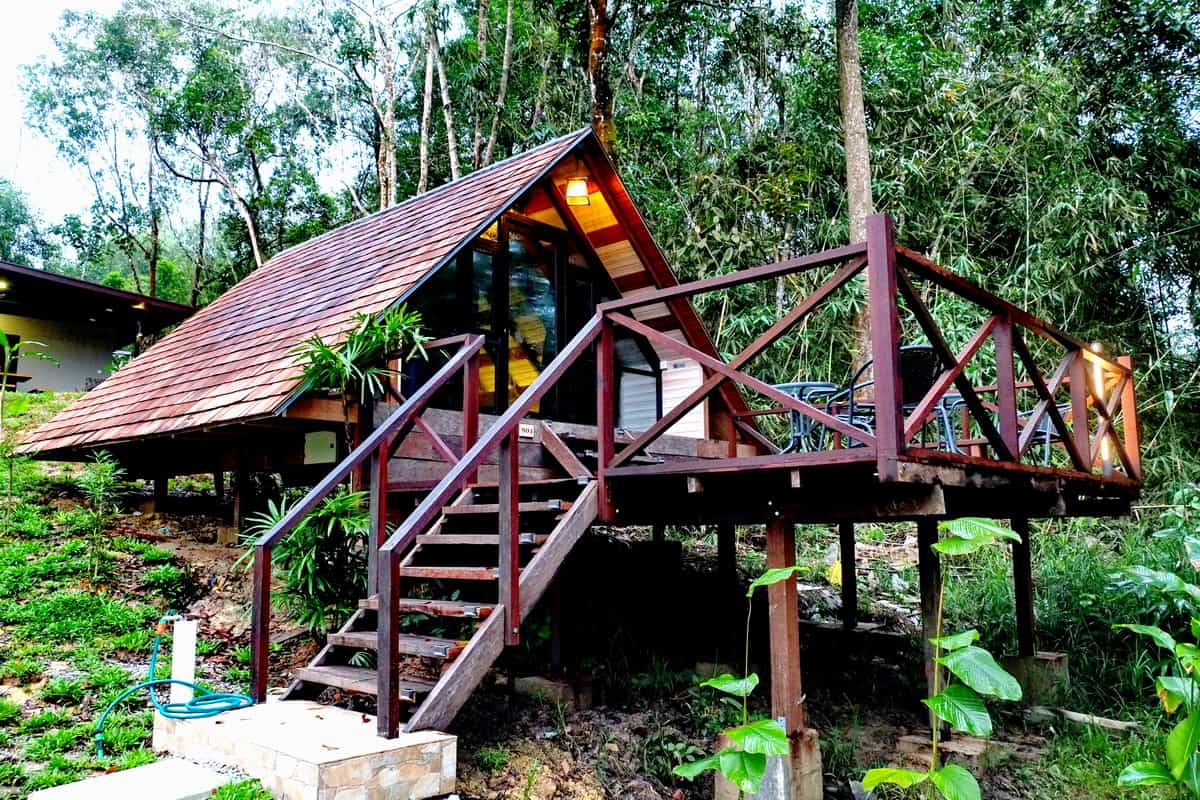
Matang
Nestled in the foothills of Gunong Serapi, cradled by a mountain stream, is the secluded Serapi Mountain Retreat. Your night here will be spent in two- or three-bedroom bungalows with shared facilities. Each room accommodates two people, but depending on group size you may share a same-sex triple room. On some departures, you may stay at the Matang Wildlife Center instead. This forest lodge is basic but comfortable and consists of simple chalets and lodge rooms with en suites or shared cold water showers, toilets and fans.
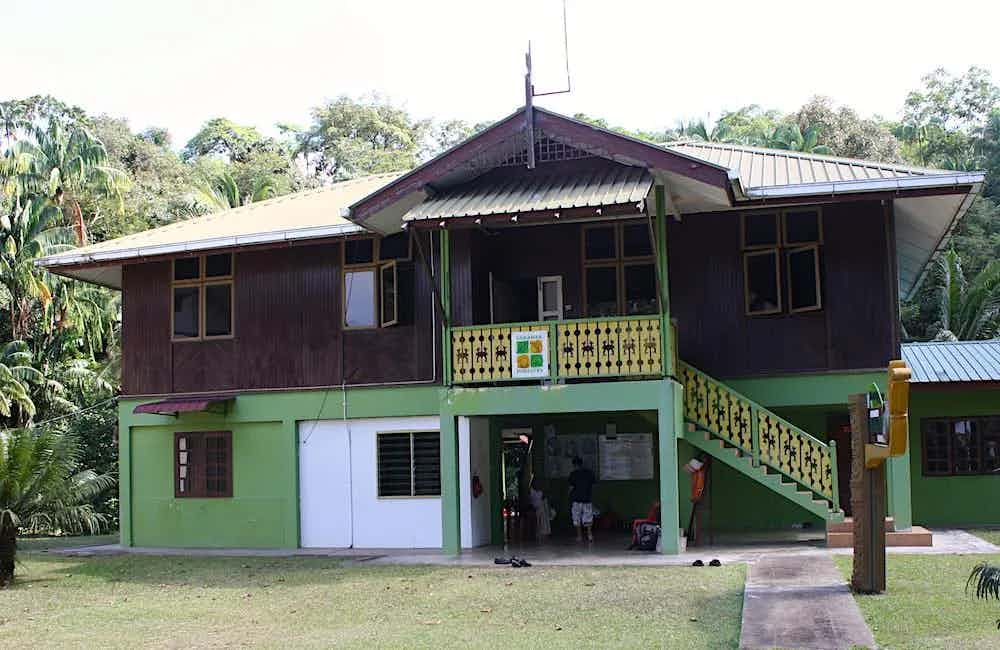
Tanjung Datu National Park
Spend one night in the untouched and pristine Tanjung Datu National Park. Due to its remoteness, facilities are basic and limited, with visitor accommodation consisting of four simple forest huts (dormitory style camping shelters) with single floor mattresses and a shared bathroom/shower (cold water). The park's remoteness is one of its main attractions and snorkelling by pristine white sand beaches and hiking untrodden jungle trails will be truly special – proof that the luxury of nature can be far more extraordinary!
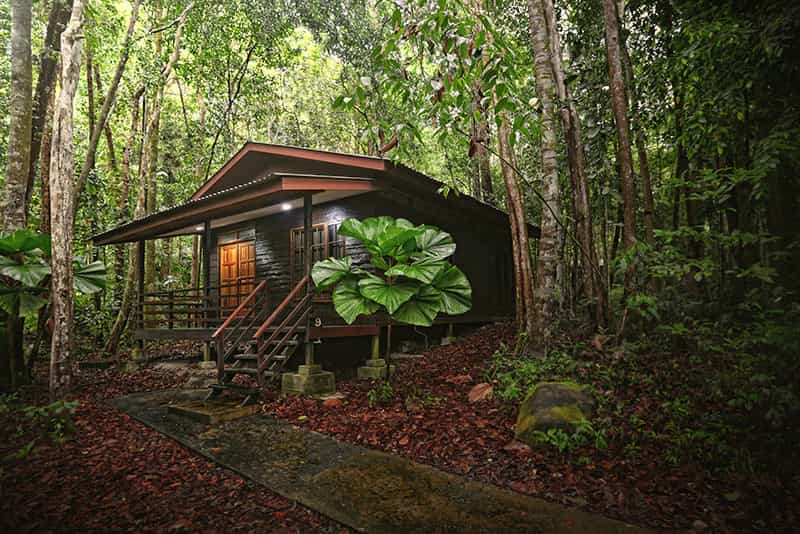
Santubong
Your final two nights will be at the comfortable Permai Rainforest Resort, backed by protected rainforest and close to a popular beach area. You'll sleep in two- or three-bedroom cabins, which have twin-share air-conditioned rooms and a shared common bathroom.
Upgrades
Due to the limited number of rooms in most locations, solo room upgrades are not available on this tour.
This trip has been rated as Easy
Although the trip grade is classified as 'Easy', it is still an active tour and you'll need average fitness to participate comfortably. You'll be walking for three to four hours on most days, typically through dense forest on (often muddy) jungle trails and there will be a few hills to climb. The high humidity combined with the tropical heat can make activities feel more tiring than usual (you'll need to keep up your fluid intake) although there will be plenty of breaks and time to take in the surrounding views, spot wildlife and enjoy the rainforest. Some rainforest walks take place at night and there are some early starts and full days. You should feel comfortable kayaking for three hours at a time and may benefit from some upper body strength to enjoy it more. The two cycling days are suitable even for novice cyclists. You'll be pedalling on gentle forest trails and tarmac roads, climbing only a few hills along the way. The ride on Day 5 is conducted at a leisurely pace and there is a support vehicle should you prefer to skip part of it.
What will I need to carry?
You'll need to have a larger bag suitable for all your belongings which will be transported for you throughout the itinerary, and then a small daypack to carry personal items during the activities each day. For two nights at the national parks (Day 2 and Day 7), it is advisable to carry only an overnight bag for ease of travel and leave your main luggage with the host.
Borneo lies within the tropics and for this reason you should expect high humidity and the chance of rain at any time of the year. The best time to visit is during the dry season from March to October. During these months the climate is typically tropical, with temperatures ranging from a cool 22°C/71°F in the evenings to a sultry 34°C/93°F in the daytime. Relative humidity is consistently high and typically around 70-90%.
The Area
Logistics
Starts
Kuching International Airport
14:00 on Day 1
Ends
Kuching International Airport
Any time on Day 10
Transfers
Free airport transfers are included if you arrive on Day 1 and depart on Day 10. If you wish to join the city cycling tour and welcome dinner in Kuching on Day 1, we recommend booking a flight that arrives by 14:00 at the latest. If you arrive later, your host will pick you up from the airport and take you directly to your hotel, and you'll meet the group on the morning of Day 2. The transfer usually takes about half an hour.
If you would like to arrive early or extend your stay, your host can arrange airport transfers and additional accommodation for an extra cost. See the Optional Extras section for details.
Travel options
Kuching International Airport (KCH) is accessible via various indirect flights from the UK, mainland Europe and US. Flights generally connect through Kuala Lumpur with Malaysia Airlines.
Enjoy 12.5% Off Outdoor Gear
In need of a few more items? All bookings receive a 12.5% discount to use at Cotswold Outdoor, Snow + Rock and Runner's Need.
What do I need to bring?
BAGS
- Soft overnight duffel bag or rucksack with rain cover (hard cases not advisable)
- Daypack (30+ litres - enough for your overnight bag to Tanjung Datu and Bako National Park)
CLOTHES
- Waterproof jacket or rain poncho
- Lightweight breathable layers
- Lightweight trousers/shorts/skirt (trousers recommended for jungle hikes, suitable for the tropics)
- T-shirts
- Lightweight long-sleeve shirt (for jungle hikes)
- Underwear and socks (including leech socks for jungle hikes)
- Swimwear (and rash vest for kayaking/snorkelling if you like)
- Sunglasses
- Sunhat
- Something to sleep in
- Lightweight waterproof hiking boots or shoes (worn-in, suitable for hot climates)
- Sports trainers with good grip (for cycling and also in case your boots get wet)
- Sandals
- Water shoes for kayaking (optional - secure sandals are fine too)
Opportunities to do laundry are limited so we recommend bringing some spare sets of clothing in case you get wet
SLEEPING
- Cotton or silk sleeping bag liner
- Travel pillow or pillowcase (optional for extra comfort)
OTHER
- Snorkelling gear (mask, snorkel and optional fins)
- Travel plug adapter if needed (plug sockets are generally UK 3-pin)
- Power bank (some places lack mains electricity)
- Passports (and visas)
- Travel insurance documents
- Ear plugs
- Insect repellent (products with DEET are hard to find in Borneo)
- Suncream
- Personal first-aid kit (inc. blister treatment, electrolyte/rehydration sachets)
- Personal items (biodegradable toiletries, sanitary wear etc)
- Toilet kit (toilet paper, biodegradable bags to carry paper out to dispose of)
- Quick-dry towel
- Alcohol hand-spray (the spray doubles up as leech remover if needed!)
- Headtorch and spare batteries (for jungle night walks)
- Reusable water bottle (x1 litre)
- 2-litre hydration bladder (to stay hydrated on the longer hikes)
- Biodegradable wet-wipes
- Energy bars and snacks
Additional night in Kuching Single/Twin/Double Room
Payable Before Departure
Additional night in Kuching Single/Twin/Double Room
…
Additional night at Permai Rainforest Resort (Single/Twin/Double villa half board)
Payable Before Departure
Additional night at Permai Rainforest Resort (Single/Twin/Double villa half board)
…
Private Arrival Transfer Kuching airport - Kuching city
Payable Before Departure
Private Arrival Transfer Kuching airport - Kuching city
…
Private Departure Transfer Kuching city - Kuching airport
Payable Before Departure
Private Departure Transfer Kuching city - Kuching airport
…
Private Departure Transfer Permai Forest Resort - Kuching Airport
Payable Before Departure
Private Departure Transfer Permai Forest Resort - Kuching Airport
…
A Fun and Active Way to Discover Borneo
This was an excellently organised trip - Kelvin worked so hard to ensure everything went smoothly from our activities to our meals. He ensured everyone was happy and comfortable with everything and made the trip with his cheeky sense of humour and big smiles. The trip was tiring at times due to the activities but this made it all the more enjoyable because you found you really made the most of each day and were ready to fall asleep to the sounds of the jungle each night.










Hell yea







Brilliant Borneo break!!
Blown away by my Borneo adventure - I have warned my friends that will be a Borneo bore for weeks after this!! I had high hopes for this Much Better Adventure, yet it exceeded all my expectations. The schedule was strenuous in the heat & humidity of jungle Borneo, but our tour coordinator Kelvin made sure we were all coping and hydrated and able to take rest breaks if needed. Kelvin was fantastic at every turn: organised, proactive, flexible, amiable and inexhaustibly cheerful! All equipment for the adventures (bikes/helmets/kayaks/lifejackets) was of a high standard and safety gear (helmets/life jackets) were insisted upon, which is great. The expert guides for jungle treks and kayaking were consistently incredibly knowledgable, I learnt so much from them! Homestay hosts were fantastic and great cooks too - delicious & delectable fresh picked local produce served up in banana leaves in the jungle was unexpected and appreciated by all of us on the trip. Staying in the longhouse, we were treated to a performance of traditional music and dance, and invited to participate - what a hoot, loved it! Rafting was not on our scheduled itinerary, but the opportunity to loan our hostess’ bamboo raft and jaunt around the lake in the evening sun after a long hike was such a joy! We saw a huge range of rare species of animals & plants in their natural habitats - this the reason I went to Borneo. Orangutans, silver leaf monkeys, proboscis monkeys, Bornean bearer pigs, Sarawak black monkeys, Paradise tree snake, green viper, tarantulas, carnivorous plants.
All amazing, totally thrilling! A huge Thank You to MBA and all its agents who made this such a memorable adventure.



Wild Adventures Of Borneo
I literally can’t find a single fault with this epic adventure. Kelvin was the best host we could possibly imagine the whole trip ran so smoothly it was like he was one of us. All the tour guides were top quality. The itinerary was so professionally put together. The places we slept at were all so different we felt like we had a proper experience of what Borneo has to offer. All the food was absolutely top notch and some fantastic surprises. I have a big appetite and never once went hungry. Honestly it was the best trip ever and so much better than I ever anticipated. Thank you so much to JC, Kelvin and the whole team!
Such an amazing experience! I
Such an amazing experience! I never thought I’d survive sleeping in a rainforest since I’m terrified of bugs but it’s 100% doable. This trip was definitely off the beaten path, in most places, we were the only ones staying in that location. It was nice to be away from technology and people, we had our own little bubble away from reality. The scenery and wildlife is so beautiful, falling asleep to the sounds of the rainforest is quite an experience. It certainly felt like a bucket list
A great introduction to the hiking trails of Sarawak's national parks. Experiencing the jungle during the night walks was a highlight of our trip, the amount of wildlife that appears after dark is astonishing. Nothing compares to watching the sunset on an empty beach, surrounded by the sounds of the rainforest. Our thanks go to Farhah and her team of guides, who made our trip so memorable.
We partner with the World Land Trust to ensure this trip achieves Net-Zero emissions. We also support their Buy an Acre programme, helping local communities to buy and protect natural habitats in perpetuity.
What's the number?
It works out on average at 540kg of CO2 emissions per person, including all local transport, accommodation, food, activities, guides, staff and office operations.
The only thing it doesn’t include right now is flights and travel to the destination. We do make an overall estimate across all our customers separately, but as we don’t book flights, have customers from all corners of the world, and no way of reliably knowing their travel plans, we simply can’t include an individual number in the figure on display here. We’ve got a goal to fix that, so that when you book, there is a way to measure and mitigate the carbon emitted by your flight too.
But what does the number mean?
Yep, hard to picture eh? To give you an idea:
- Driving 1000miles/1609km would be approx. 281kg of CO2 in an average car (or 140.5kg per person if there was 2 of you in it).
- A return economy class flight London - New York would be approx. 1,619kg (1.66 tonnes) per person.
- 10 trees in a temperate forest are estimated to remove approx. 250kg of CO2 from the air in a period of 5-10 years.
What are we doing about it?
Our trips are relatively low-carbon by design, and we're working with all our hosts to develop long term carbon reduction plans. We partner with the World Land Trust to ensure this trip achieves Net-Zero emissions. We also support their Buy an Acre programme, helping local communities to buy and protect natural habitats in perpetuity, ensuring the protection of the reserve and its wildlife.
Want to know more?
Amazingly, no international travel company has ever publicly published their carbon measurements before, as far as we know. We believe that must change, quickly. So we’re openly sharing the method we used in the hope that other companies will be able to more easily follow suit and build on what we've done so far. You'll find it all here.
Marta Marinelli, raised in Italy’s serene Prosecco Hills, dreamt of global adventures, inspired by her father's travel stories. Her passion evolved into a career, backed by a decade of studies including degrees in international tourism and destination management. She’s worked in the adventure travel sector since 2012, living in Italy, the UK, and now sunny Portugal.
Over twenty years, Marta has explored over 55 countries, visiting remote areas like Ghana, Rwanda, Sao Tome and Principe, Haiti and Nepal’s Upper Mustang region. As a Senior Adventure Expansion Manager at Much Better Adventures, she focuses on creating life-changing experiences, ranging from multi-activity adventures, challenging treks to ultimate adventures in iconic places. She loves the challenge of finding the best local adventure hosts around the world, collaborating on adventures that offer genuine immersion, pushing beyond the beaten path and working on exclusive itineraries that challenge your comfort zone.
What makes her tick? Enabling people to live adventure-rich lives while positively impacting and empowering local communities around the world, generating sustainable opportunities for both the host, guides, community, and the environment.
Sure can! Over 70% of our travellers travel solo, it’s a great way to meet like-minded people.
Tips are not included in the trip cost. These are entirely at your discretion but there is an expectation to tip for good service. Of course, the amount should be reflective of your perception of service and quality – a tip is not compulsory and should only be given when you receive excellent service.
If you wish to extend your trip and climb the famous Kinabalu summit, the easiest way is to fly from Kuching to Kota Kinabalu (1.5 hr direct flights with AirAsia or other airlines). Permits need to be obtained far in advance and you can book via local agencies.
The tap water in Borneo is not always friendly on the stomach for those who haven't been in Malaysia for a while. You may find purified water in some of the accommodation which you can use to fill up each morning, so be sure to pack a reusable water bottle or two. To avoid plastic waste where filtered water is not available, we suggest bringing water purification tablets or a different purification system for extra safety. Please find more info here.
We recommend checking out the country specific information here and also talking to a travel nurse.
The Semenggoh Wildlife Centre, set in a nature reserve in Sarawak, is one of the best places in Borneo to view semi-wild orangutans. The orangutans have been rescued from captivity and trained to survive in the surrounding forest reserve. The park has been around since 1975, and was established with three aims: to rescue, care for and rehabilitate endangered wildlife back into the wild, to conduct research on endangered species and captive breeding programmes, and finally to educate the general public on wildlife conservation. A variety of animals are under its care, but it is the orangutan rehabilitation programme which has been the most recognised and the most successful. Newly rehabilitated orangutans are then released into Kubah National Park.
By visiting Semenggoh and other genuine rehabilitation centres in Borneo, you are supporting projects that are working tirelessly to help save the orangutans and their habitats. This is an example of how responsible tourism can have a real, tangible benefit and how you as a traveller can help save some of the wildlife you have travelled around the world to see. You'll be asked to follow a specific code of conduct to ensure your visit is responsible (such as by keeping a safe distance from the orangutans and keeping noise levels to a minimum), and please bear in mind that sightings are never 100% guaranteed, as the animals are free to roam in the large protected forest area where they live.
On the trip you'll spend a day and night with a thriving rural Bidayuh community, the second largest indigenous tribe in Sarawak and home to one of the few remaining traditional Bidayuh longhouses in Sarawak. Upon arrival at the village, you'll walk through the farmlands with the local community host to see the rice fields, pepper farm, rubber plantation, and tropical fruit orchards – a fantastic opportunity to learn about their culture, history, and contemporary life. In the evening, you'll experience how the Bidayuh prepare dinner, cooked with simple and natural ingredients.
The homestay program is run and managed by the community itself and it is a successful example of how community-based tourism can be successful when done sensitively, facilitating cultural exchange and playing an active part in the maintenance of indigenous culture and traditions through their celebration.
This trip visits locations where daytime temperatures can be extremely high during the times of year when this trip operates. High humidity and limited access to shade can also be factors, and warm temperatures can continue into the nighttime, which additionally influence the body’s ability to cool down. Personal care should be taken to keep cool as best possible in the conditions, such as wearing appropriate clothing and proper hydration. Very high temperatures can impair an individual’s physical abilities to perform an activity that they may otherwise be able to do competently at cooler temperatures. People may experience symptoms associated with dehydration and Heat Stroke. Your guide(s) are trained to mitigate the risks associated with high temperatures, by carefully managing the intensity of the activity, and to provide the appropriate support response should someone feel ill during the trip. Should you experience health issues during your trip you should inform your guide immediately so the proper care can be provided.
Our recommended travel insurance provider is Campbell Irvine.
Travel insurance is compulsory for all of our adventures and you are required to provide your policy information before departing.
Your insurance should include adequate protection for overseas medical treatment, evacuation/repatriation, your baggage and equipment and the specific activities involved on your adventure. We also strongly recommend it includes cancellation and curtailment insurance, should you be unable to join your trip for specific reasons such as illness.
We fully endorse Campbell Irvine as their insurance offers all of the above, so get in touch with them or call on 020 7938 1734 to get your insurance sorted. We suggest that you book travel insurance as soon as you book your adventure, just to cover you for any last-minute life changes. We know you’re an active lot and injuries do happen!
We automatically convert prices from the local currency that a host receives to your chosen currency. We update our exchange rates on a daily basis so this does mean that prices displayed on the site are subject to currency fluctuations, which is why you may see them change over time.
If you wish to change the currency you pay in, head to the bottom of the page.
All of our group adventures are specially designed for adults to enjoy (18+) as we want these adventures to bring together outdoorsy people who are truly like-minded. Children can be accommodated on some private departures.
You're always in good company on one of our adventures.
Our trips are typically made up of a mixture of solo travellers and small groups of 2 or 3 friends, with most in their 30s-50s.
Our sociable adventures are solo-friendly by design and naturally attract outdoorsy people with a shared mindset; a love for adventure, a desire to push themselves and meet awesome, like-minded people along the way.
It’s this camaraderie that has so often turned a great adventure into a life-changing one.
Don't just take our word for it:
- 95% of people rate the group dynamics on our trips 5/5
- 90% of people recommend joining a trip to make new friends
- 75% of people have met people on our trips that they would now consider friends
See here for more info about the Much Better Adventures tribe.
Interested in a more exclusive experience? Opt for a 'Private Group' through the dates and prices tab to book this adventure for just you and your chosen companions.
Our team of Adventure Hunters create exclusive adventures with highly vetted, specialist hosts. We only work with independent, local in-destination experts who know the very best places to explore and how to stay safe. Read more information about the local teams we partner with.
Much Better Adventures refer to the UK Government’s official travel advice when designing trips and monitoring trip operations. We recommend that all customers are familiar with the practical information provided on the Government’s FCDO website, where current travel advice can be found by searching for the applicable destination(s).
For customers joining this trip from other international destinations – please also read the official travel advice applicable to your country of residence/origin, as this may differ.

Got questions? We've got answers
We've got your back
Guaranteed to run
All our trips are now guaranteed to run. Once you’ve booked your spot you can immediately make your travel arrangements, no uncertainty, no hanging about (excludes 'request to book' departures). Full details
Flexible payments
Secure your spot with the minimum deposit and pay off the remaining balance in as many instalments as you like, with no interest or fees. Full details
Happiness Guarantee
We’re so confident you’ll have an amazing time we’ll put our money on it. Full details
Full financial protection
To give you complete peace of mind we’re backed by ABTOT, ABTA and ATOL memberships. Full details
Tried & Trusted
We’re rated ‘Excellent’ on Trustpilot with over 900 verified trip reviews averaging 4.8/5.
Connect before you go
You'll be invited to join a WhatsApp group to get to know each other before your big adventure together. Full details
DEPARTURE DATES
Saturday • 5th October 2024
to Monday • 14th October 2024
